
- [109] The Story Behind The Earthquake
At Beijing Times (1/31/2006) In Ming Pao Monthly, there
is a piece about the Beijing Times story. The full Chinese-language
version is here.
Much of the story is known, so I will translate only the interesting
sections:
From the timing of the re-organization, Guangming Daily has clearly
made a careful decision. First, the action took place at the end
of December. Basically, the Beijing Times subscription orders for
year 2006 would have been mostly sent in by then. Secondly, if the
workers protest and quit immediately, the newspaper can save a
significant sum in year-end bonuses (note: the Chinese New Year begins
near the end of January).
The situation is now clear. From the experience of previous
efforts to re-organize newspapers, Beijing Times will not be able to
maintain its edge and dash, and it will probably become another
government mouthpiece like most of the newspapers now. The sister
publications Southern Weekend and Southern Metropolis Daily are
examples.
The changes begin at the senior level with core members being removed
or replaced one at a time. This causes the quality of the
newspaper to tumble. Some Beijing Times workers believe that
before Guangming Daily took action against Beijing Times, they must have
obtained the consent of Southern Daily. Therefore, they believe that they
were betrayed. At the moment, some of the editors and reporters at
Beijing Times are hunting for jobs and it is expected that a
considerable number of core members will be departing after the Spring
festival.
As Beijing Times has established a good brand image and won a certain
social trust, Guangming Daily will be able to enjoy the fruits in the
short term. Yet, the parent organization Guangming Daily has few
readers and low circulation, so it is hard to see any long-term
prospect.
I love the first paragraph. It is all about money. Whatever
happened to ideological purity?
- [108] Are TV Ratings Important?
(1/31/2006) Interview of Zhu Jun (
朱军),
the host of the CCTV program Artistic Life (艺术人生)
by Yangzi Evening News via MediaChina.net:
Reporter: Concerning the drop in the tv ratings for Artistic Life
recently, how do you see it?
Zhu: ... Television ratings are just something cranked out by a
machine. It remains to be seen whether there is any science in
it. It is just some data for reference.
Reporter: You do not value ratings then?
Zhu: I feel that the media ought to have responsibility. This
is not about making up something that will attract eyeballs. The
more important thing is to let people think and to bring them meaningful
programs, especially in a country like China with a deep traditional
culture. If this is just about pursuing television ratings, I
could just bring a dog along. This is the Year of the Dog, right?
(laughs). On today's program, I will shave off the hair on the
left side of the dog's head. Then I will ask the audience to send
SMS to guess which other part I will shave tomorrow? This kind of
entertainment will definitely raise the ratings. If you want to
compete just for ratings, then there are too many ways to do it.
Reporter: Do you think that this is a form of entertainment?
Zhu: It is entertainment, but it would be wrong to say that it is
purely about entertainment. It is even worse to entertain for the
sake of entertainment. The program group receives a ratings report
each week. When this week's ratings are lower, some group members
get worried. So I tell them, "You do your own work well and
don't let that affect you. It is normal for the ratings to go up
or down. For example, when Jewel Of The Palace was on air,
its ratings were very high and the other programs had lower
ratings. When that show is over, the other programs will come up
again. There is nothing strange about that, right?
- [107] The Angry River People Talk
Back (1/30/2006) You have heard one side of the arguments
about the Nujiang dam project (see Comment
#023). Here is the other side, which is less likely to be
heard in the western media, in a Xinyushi
forum post. The writer was an environmentalist until he went
to visit the site and was asked some questions for which he had no answers.
[in translation] During the visit to the Three Rivers Source Protected Zone, a pretty
local girl was the guide. She clearly loved her hometown. I
asked her how could a person who loved the Three Rivers Source be
actively supporting the construction of the electricity generator
plant. She looked at me strangely and said, "The electricity
generator plant will be good for the people. You don't expect us
to be so impoverished as to not even have a piece of cloth to cover our
arses in the name of environmental protection?"
... Many places along Nujiang are nationally designated poor
counties. The counties generate less than 20% of their financial
budget from their own revenue (note: the rest is picked up by the
provincial and national governments) ... I visited a peasant home and I
observed their "house" and their belongings. It was
enough to make me feel the sort of sadness that causes people's eyes to
ache. A local official responsible for children aid told me that I
was only seeing those families that had the means to live.
Previously, they had accompanied a UN aid official to a village that was
destroyed by a mudslide. For one family, their entire possession
was a blanket issued by the aid department and a small piece of cured
meat that had turned black. The householder said that this piece
of meat was meant to be saved for later, but some had to be given to the
sick child that day.
... While I was there, the most frequent thing that I heard was this:
Are you against the electricity generator plant? How about
this? You gather all the opponents here in Nujiang canyon and if
you can survive for two months eating the food that the Nujiang people
got out of their land through their own labor, then maybe you are
qualified to start
talking about opposing the electricity generator plant!
- [106] New Year Message
(1/29/2006) Wenweipo:
SMS to Bejing residents: "The Beijing City Party Committee and City
Government wish all citizens a happy spring, a safe year and happiness for
your family. Here, we especially want to ask you to watch your safety
during the festival and observe the "Beijing City Fireworks Safety
Management Rules."
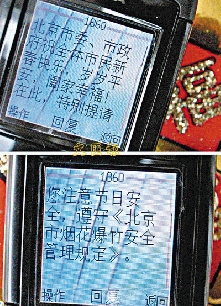
- [105] Yu Hua's Blog
(1/29/2006) From China Youth Daily via MediaChina.net,
here is famous writer Yu Hua's thoughts about his personal blog.
[in translation] Four months ago, Yu Hua opened his personal
blog and this became a sensational news item. Very quickly, the
number of visitors went into the hundreds of thousand, and Yu Hua
enjoyed it greatly. He reflected: "Can I sell so many books
in such a short time?" Yet, four months later, Yu Hua is
rueful. He told the reporter frankly yesterday: "I never
thought that the netizens would be so enthusiastic in leaving
comments. I started off wanting to answer every comment, but now I
found that to be impossible."
Apart from this, the complex nature of the Internet environment also
surprised Yu Hua, who is new to using the Internet. There were
malicious attacks, there were self-promotions and there were people who
want to use the space to post advertisements. Yu Hua had no better
idea than to delete the "trash" as quickly as possible.
Compared to his early enthusiasm, Yu is now more low-keyed after these
'setbacks.' He is no longer writing new posts, but he is just
copying some lesser known essays written over the past ten years.
"I want to be lazy, so I thought of this method. If I post
once every few days, the inventory should last three or four years
easily."
- [104] Your Implicit Association Test
(1/29/2006) In Why we should start measuring bias
by Jay Dixit, Slate, you can find the Implicit
Association Test. Direct query about opinions on
race/ethnicity does not work because people may not tell the truth
(consiciously or unconsciously), so this test is measuring response times to
images. I'm a bigot (well, actually, everyone is going to be a bigot
one way or the other) as I found out that I regard Asian-Americans as more
American than European-Americans whereas other test takers
(European-Americans?) usually get it the other way around. I am not
shocked.
- [103] The Case of Li Erliang
(1/28/2006) China Youth Daily editor-in-chief Li Erliang must be
wondering what he had done to deserve this job. His name first came
into worldwide prominence as a result of an internal letter to him from
Freezing Point weekly magazine Li Datong that was leaked to the public in
August 2005 (see previous post).
After attending a class on "opinion battle" for
editors-in-chief, you told us back at the office that you have "finally
totally understood." What did you understand? You understood
that "propagandizing" comes from "needs." At the
meeting, you pointed to our reporter who was covering the Ren Changxia case,
"Everybody knows that the relationship between Ren Changxia and her
husband was very tense, but when you write the case up, you should write that
relationship as being better. This is a matter of need." ...
As for "opinions", you "understood" how it
came about. You can create rumors and tell lies. You said,
"This was how America went to war against Iraq!" Never mind whether
America was like that or
whether American media were like that. Even if that were true, we should
not imitate their example. Creating rumors and lies based upon
"needs" means making up and re-arranging facts. Such behavior
have been thoroughly rejected by Chinese media, at the repeated insistence of
the Central Propaganda Department. You came over from the People's
Daily. Did the colleagues at People's Daily not reflect with pain and
regret that their "propaganda" and "opinions" during the
periods of the Great Leap Forward, the Anti-Rightist Campaign and the Cultural
Revolution" caused grave damage to the country and the people? Are
such behavior not to be rejected thoroughly forever by all party newspapers,
including our newspaper? Did you not notice when you spoke about how you
"finally totally understood," some people in the audience were
snickering?
There were in fact some honest exchanges between the two later on and
Li Erliang would turn out not to be an implacable party hack from those
notes. Fast
forward to January 2005. In the recollection by Li Datong (see previous
post):
On January 11, the Freezing Point special
article published Mr. Yuan Weishi's essay: "Modernization and History
Textbooks." Mr. Yuan used solid historical material to criticize the
history textbooks used in junior middle school. The essay was sent to
the editor-in-chief for review, and he did not agree with its publication for
the reason is that textbooks represent national activities that cannot be
criticized. I disagree with this reason. So we can't talk about
party history, but why we can't we talk about late Qing history? Mr.
Yuan's essay only offered some historical materials and conlcusions known to
everyone in the history field. So why can't it be published? Of
course, this subverted the sayings in the middle school next book, but the
television drama <<Going Towards The Republic>> was even much more
subversive and CCTV let a hundred million people watch it. This reason seemed to have convinced the
editor-in-chief, who agreed to publication with some minor deletions and
editing.
On January 25, Freezing Point was shut down for re-organization.
Included in the notice from the Central Propaganda Department is this
item:
1. A notice of criticism will be directed at
China Youth Daily party deputy secretary and editor-in-chief Li Erliang and
China Youth Daily Freezing Point Weekly editor Li Datong;
2. China Daily will stop publication of
Freezing Point for the purpose of re-organization, and impose appropriate
economic sanction(s) against the responsible person(s). Freezing Point
Weekly will stop publication for re-organization as of January 25, 2006.
Li Erliang may have lost his New Year bonus this time. Poor baby!
- [102] Toilet Business In Hong Kong
(1/28/2006) (SCMP) A group of young entrepreneurs saw their $80,000 investment in one of this year's hottest-selling items at the Victoria Park Lunar New Year fair flushed away when HSBC "advised" them yesterday to stop selling rolls of "banknote" toilet paper.
The cheeky product - selling at $38 a roll - had buyers queuing for it since the market opened on Monday. The paper is printed with an $800 "note" on each sheet, featuring a dog in place of the bank's iconic lion to mark the Year of the Dog. And instead of "HSBC", the sheets carry the letters "HPNY", standing for Happy New Year.
"We have stopped selling it. The bank is rich and powerful - we can't take them on," he said. "More people have been asking about the paper today but we had to tell them we don't sell it any more."
Mr Chan said the notice was an advisory and did not threaten legal action. "But we take the hint."
HSBC yesterday admitted that no one would mistake the toilet paper for real money.
"There is no possibility of that," a spokesman said. "It's just a straightforward infringement of our copyright. We are obliged to protect the integrity of our banknotes."

(Photo from InMediaHK)
Would you mistake this for a real HK$800 note? Oh, by the way, there
is no such thing as a HK$800 note -- only HK$500 and HK$1,000 notes are
circulated.
- [101] Anti Has A Sina Blog
(1/28/2006)
安替的BLOG
has nothing there yet. Massage
Milk speculates (in jest, of course):
[loose translation; loose because he is too funny
and I can't reproduce it in English] Since you know that Comrade Anti
has ruined two blogs already, he must have ulterior motives over at
Sina. We know that Sina blogs have the characteristic of being clean --
like an obsessive-compulsive person, they clean the space every day until it
is spotless (with the exception of the social and entertainment news sections,
of course). So a dirty-minded person like Anti wants a Sina blog for one
and only one reason -- he wants to become a human suicide bomb to check the
sensitive keywords at Sina, to test the endurance of the editors and the
nerves of the supervisor (and whether the delete key on the supervisor's keyboard is
functioning properly). So Comrade Anti will be a mine sweeper who is
going to step into the minefield and detect the sensitive words one by
one. In the end, though, we all know that Comrade Anti's blog will be
dead. The only question is the manner of death ... Will he die alone in
the minefield? Will
he take Sina down with him by detonating the suicide bomb? Or will he become
yet another Sina celebrity blogger and forget about the mission?
- [100] The Cultural Revolution In The
Internet Age (1/27/2006) Here is an interesting speculation in
the newspaper comment via Miss
Lee in Summer.
「假如有了互聯網,年輕人從早到晚都忙坐在電腦屏幕面前msn或icq了,誰還有時間和心情跑到路上揮舞三面紅旗﹖有了互聯網,年輕人可忙得緊,看圖、寫blog、打機、BT、eMail……在網絡天地裏,每個年輕人都是自主自立的毛主席,發號施令、改造世界,幹啥還要聽什麼黨委書記或鬥委主任的瞎指揮﹖在各式各樣的留言版上,幾位『糞青』互通八卦、月旦人物,自成一個虛擬的『四人幫集團』,還有必要忠心耿耿於北京城內的那幾位長相惡俗的阿叔阿嬸﹖」
If the Internet had been around [during the Cultural Revolution], the
young people would have been too busy sitting around all day in front of the
computer montior doing MSN or ICQ. Who has the time to run around the
streets waving the Three Red Flags? With the Internet, the young
people are too busy viewing pictures, writing blogs, playing online games,
BT, eMail ... in the Internet world, every young person is his/her own
Chairman Mao, issuing orders and transforming the world. Who needs the
party committee secretary or the struggle committee director to issue
orders? At various comment sections, the "angry young men"
(="shitty" young men) are exchanging gossip and forming their own virtual Gang of Four. Who is going to be loyal to the ghastly-looking uncles and aunties in Beijing city?
That is a very interesting idea -- the Cultural Revolution would not have
been feasible in the Internet era. If true, then we are marching down
an irreversible path.

I wish somebody would take the position of the typical Chinese internet user. If one is going to advocate a boycott, I would like the criteria to be the material improvement in the life of the typical Chinese internet user.
I think talk of boycotting Google is a bad idea. People in China will not appreciate that because these are esoteric issues for them.
There are a number of search engines and there are many different ways of searching. People want more choice. Don't tell them they are free by advocating a boycott.
I conducted a little test. I searched for mention of the circumstances under which a supplement called
Bingdian (Freezing Point) was recently banned in China. The editor of this supplement had written a letter of complaint.
Any mention of this on the local Baidu search engine has disappeared. In fact, when you put a banned search term in, the engine shuts down. If you put in a term like June 4 [the date of the Tiananmen Square massacre] the result is "Not Found". And then you can't search again for 30 minutes. It's a very upsetting experience.
But with Google.cn there are different ways of finding things. You can try any number of subtle combinations. Google gives you more opportunities to triangulate.
There are all kinds of devious ways in which internet democracy can work. Better to have something than nothing.
People are missing the point if they set up the debate that Google is evil. In the end it's down to local laws. The real battle is for the Chinese to fight this law.
- [098] Sidekick Reviews Hong Kong
Blogosphere (1/27/2006) My secret project for year 2006 is
already completed in January! Actually, I did not do anything, but
somehow my goal of getting Hong Kong blogger Sidekick into the
Chinese-language mainstream media has been accomplished. In Issue #829
of Next Magazine (see 中國博客狂熱@壹週),
Sidekick gets a half page (almost) in an article on the Chinese blogosphere
(alongside people like Mu Zimei and Anti).
Here are Sidekick's comments on the state of the Hong Kong blogosphere:
[in translation] Compared to the mainland, Hong Kong blogging
is weaker. Sidekick, who gets about 1,000 visitors a day, is said
to be one of the most popular. She was also invited to attend the
Chinese Blog Conference in Shanghai last year. "Hong Kong
bloggers are quite diversified. There are people who write about
technology, and there were people who write short stories."
Sidekick claims: "Many people read me because I write about
different things. I present technology, I write about fashionable
things and I comment on current affairs. Everything. Other
people can easily reach my website through search engines."
Sidekick believes that Hong Kong blogs are weak because there are no
standout bloggers such as Mu Zimei and Furong Jiejie and therefore
cannot create a heat wave. Secondly, Hong Kong did not have too
many blog service providers previously until the recent appearance of
Yahoo's yblog, Now.com's hompy and Sina.com's mysinablog. This was
fully two years behind the mainland. Thirdly, Hong Kong people do
not have great writing ability and they have too little time, so there
are fewer serious bloggers. "You see that movie critic 'Mike'
(邁克)
chose to set up a blog at blogcn. So he may have seen that there
are more readers over there. This shows that there is no heat wave
in the Hong Kong blogs."
In my opinion, none of these things should be a barrier. Why do I
say that? It is the definition of the Internet -- it breaks down
borders! There is no difference between Hong Kong, mainland China or
anywhere else anymore. First, if you want to become Muzimei, Furong
Jiejie or whoever, you can do it anywhere because it can't be that
difficult, eh? Secondly, who cares about where the blog service
provider is located anyway? Thirdly, it is not about writing skill
or time on hand; it is about the will and desire to do so. For
example, I am convinced that a Hong Kong person can easily become the top
Internet political commentator/blogger for Greater China.
Furthermore, this person will have some built-in advantages, for this is
where borders do matter as he/she has open access to information and has
no censorship.
Anyway, I now need another project for the rest of year 2006 ...
- [097] Ma Ying-jeou Explains
(1/27/2006) "Please
Use Civilization To Convince Us" may have been addressed by Lung
Yingtai directly at Chinese President Hu Jintao, but the first person who
was forced to respond was KMT chairman Ma Ying-jeou. Here is the
opening salvo in Lung's essay:
In January 2006, Kuomintang chairman Mr. Ma
Ying-jeou gave a speech to encourage his Kuomintang Youth League members and
told this joke: "I hope that the Kuomintang Youth League can produce a Hu
Jintao some day." I believe that this is the most
ill-considered joke that he had made in his entire political career.
Via ChineseNewsNet,
Ma Ying-jeou had to explain the next morning (note: Lung Yingtai had an
open question as to whether she is influential -- this has just been
answered). He said that he was not praising the Communist Party.
He only wanted to emphasize that the KMT must also value the views of
young people, or else they would be worse than even the Communist
Party. He implied no value judgment with respect to Hu Jintao.
He pointed out that he also mentioned Germany's former Chancellor Schroder
at the time as well.
The reason that this story is being reported at ESWN has nothing to do
with Ma Ying-jeou. It has to do with the fact that when the question
was raised, the KMT chairman felt compelled to respond the same morning
that the essay appeared in a Taiwan newspaper, whereas the direct addressee of
the open letter, Hu Jintao, is unlikely to ever acknowledge its existence.
- [096] Google.cn (1/26/2006)
There are a lot of other things going on right now than worry about this
storm-outside-the-teacup issue (go read Danwei,
Imagethief
(and the links at the bottom of that post) if you want something
useful). I read Jonathan Loades-Carter's Google’s China site sparks bloggers’ outrage
at FT.com. At the end, I came out with a thought -- Who are these
'bloggers'? Where do they come from? I don't know who they
are, but they don't seem to be Chinese bloggers.
Here is the problem that I always have (see US
Congressional Hearings on Chinese Internet Censorship). This is
about Chinese Internet censorship. Maybe someone should be asking
Chinese Internet users what they think, eh? Let me propose this.
Whether Google is evil or not means nothing to the Chinese Internet users;
that would be an American problem. What matters to the Chinese
Internet users is whether google.cn will make a material difference to their
Internet experience, one way or the other. So when anyone wants to
propose something or the other (like boycotting Google to force them to
scrap the google.cn service), please explain why the Chinese Internet users
will be better off as a result under your specified criteria.
(Life
After Jiangxi) I did actually run a really detailed poll of one young Chinese internet user who happened to be in my flat yesterday. His response was a rather indifferent, "Who cares? I always use Baidu." Which I suspect is going to be a pretty common opinion.
I'd like to reiterate that these users are young, educated, nationalistic and very pragmatic about censorship and life behind the firewall. They neither want, nor need to be rescued by international outrage over American internet firms. If the American internet firms don't operate here, they'll just use the Chinese ones (proudly, at that).
(Life
After Jiangxi) I've just doubled the size of my survey of the impact of google's decision to directly enter the Chinese market on local internet users to two.
The result is still running at 100% for "Who cares? I use Baidu."
I decided to expand the questionaire this time and also ask, "Do you care that
Baidu's results, and now Google's results will be censored?" The answer was, "Why do foreigners always get so excited about politics?"
Among the 'other things' going on is the Freezing Point affair. For
those in China who need to track down documents, having one more good search
engine that behaves differently is a real blessing. They will not
appreciate this as a victory for Internet freedom in China if it were not
there.
The most important Freezing Point document right now is The
Open Letter from Li Datong. Since Freezing Point is now a
sensitive keyword, Li's magazine has been shut down and his blog is down as
well, the only distribution mechanism is through email and other personal
blogs. Here are a couple of blogs: Example
1 and Example
2. Oh, yes, these are blogs running on the evil MSN Spaces
which some people want to shut down in the name of freedom of speech.
Think again ...
- [095] Comparing ESWN and MSM
(1/26/2006) Take the case of the shutdown of the Freezing Point weekly
magazine of China Youth Daily. You will find the mainstream media
report on the news, the brief telephone interview with editor Li Datong and
the idea that the article about Modernization and History Textbooks by Yuan
Weishi might have something to do with it. That is what you will get
from mainstream media. From ESWN, you get instead the full translation
of Yuan Weishi's article (History Textbooks in China)
so that you can see how damning it was for yourself. You can also read a full
translation of the other potential suspect by Lung Yingtai (A
Chairman Bowed Formally Three Times). On top of that, you can get
far beyond the one paragraph summary with Li Datong. You can get the
full translation of The Open
Letter from Li Datong. This is the essence of the
EastSouthWestNorth experience.
- [094] Tracking
Freezing Point in China (1/26/2006) So I am given what I
thought was an easy task about what happened to the Freezing Point weekly
supplement at China Youth Daily (see Comment
#092). As the whole world knows by know, it was an article
about history textbooks that killed it (see History Textbooks in China
for full coverage and translation). My first stop was at the search
engine market leader Baidu. There were two references to the author: 大学教授袁伟时的汉奸言论和混蛋逻辑
and 中国要欢迎强盗来家杀人放火吗,
both of which are frontal assaults on the essay. The original essay
itself is not available. This does remind me of the Cultural
Revolution days when the Chinese masses were expected to criticize the movie
Chungguo by Italian director Michelangelo Antonioni whom nobody in
China had seen.
Next, I get into the recently hot subject of Google.cn. I punch in the
title of the article "現代化與歷史教科書"
and the server reads my IP address and routes me to Google.com.hk
instead. There is a link at China
Youth Daily and it still worked!!! Furthermore, there is a
link to none other than People.com.cn!
What kind of world are we living in!? It just goes to show that the
complexity of the real world is rapidly going beyond the reach of the finite
number of bodies at the Central Propaganda Department.
At this point, I am calling for help from inside China. Specifically,
can you please email me about what you get when you punch in (1) 現代化與歷史教科書and
(2) 袁偉時+中国青年报+冰点
at google.cn?
Email to eswn@zonaeuropa.com
with your findings.
At this point, I'm going to quote the Non-Violent
Resistance blog: "The google.cn thing really sucks. I have noticed increasing instances in which my searches turn up dead using google.com, news.google.com, and images.google.com. It would be a total nightmare if one cannot access google.com in China, especially for journalists. True, we have Factiva and LexisNexis as a last resort, but those things cost...
I only wish Google's latest ass-kissing is only about google.cn itself --- I never use it anyway, but set my IE Google Toolbar to search via Google.com. But if they reroute all China traffic to Google.cn, then I am screwed."
- [093] The Maid's Diary
(1/25/2006) From Ming
Pao, a Hong Kong former soccer goalie successfully appealed his rape
conviction. The ground was that the judge did not instruct the jury
that the testimony of the Filipina maid may be unreliable. This was a
case in which the man claimed the five acts of sexual intercourse were
consensual whereas the maid said that she was coerced. The material
evidence included a t-shirt with the man's semen. The case will not be
re-tried.
Meanwhile, from Apple
Daily (Taiwan), a man has been convicted of raping an Indonesian
maid and sentenced to 7 years in jail. The maid claimed that the man
brought her back to his factory and raped her once or twice a week for
almost six months, sometimes employing a vibrator or a dildo to torture
her. In his own defense, the man denies any rape at all.
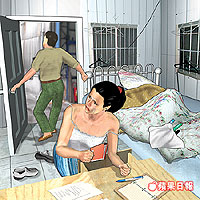
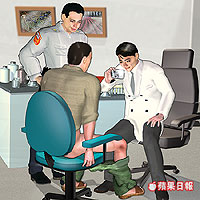
So how did this he-said-she-said case get resolved? The maid kept a
diary that contained a detailed description of the man's penis, as well as a
dermatological scar nearby. The judge ordered a legal doctor to
conduct an examination and confirmed that the details matched.
- [092] The Death of Media in China
(1/25/2006) Mirror, mirror, which is the most influential, beloved and
anticipated media section in China? The weekly Freezing Point
supplement in China Youth Daily. Of course, the above is a personal
opinion of the ESWN blogger, as reflected in The Letter of Li Datong,
Taishi Village, My Neighbor,
A Chairman Bowed Formally Three Times, My Last Assignment,
Give Me Back My Final Right.
From Boxun:
中国青年报编委以上的领导今天下午全被叫到了团中央,宣布了《冰点·观察》周刊停刊决定。全国各大报社已经收到中宣部通知,不准就此事作任何报道和评论。团中央也只是在宣布上面的决定,并非团中央所为。报社内部也不知道被停的原因,有人猜测说是与龙应台及袁伟时两篇文章有关。(in
translation) China Youth Daily editors and more senior leaders were summoned
to the China Youth League central committee to be told the decision to suspend
the Freezing Point weekly supplement. All major newspapers around the
country have received instructions from the Central Propaganda Department not
to report or comment on this matter. The League Central Committee is
only announcing the decision made from above, and this was not their
decision. The newspaper staff does not know the reason, but speculations
are that this is related to the Lung Ying-tai and Yuan Weishi (袁伟时)
articles. The Lung Ying-tai article is
A Chairman Bowed Formally Three Times
(see December 2005 Comment
#013 about why this was so astonishing), and I promise to translate
the Yuan Weishi article ASAP.
- [091] The Zhang Dejiang Watch
(1/25/2006) This is China and therefore all news are published (or not
published) for political reasons. There is nothing much about Zhang
Dejiang within China, because the powerplay has been taking place in the
Hong Kong media instead. In the post The
Case of Zhang Dejiang, Asia Weekly (and ChineseNewsNet) had reported
that Zhang Dejiang's report on the Shanwei (Dongzhou) incident to the
Politburo was not 'accepted.' In essence, Zhang said that the
Politburo should trust that Guangdong can handle the problem but the
Politburo declined to accept that assertion based upon a string of
internationally known incidents in the past two years.
More recently, three Hong Kong newspapers (including Sing Tao) cited
'informed sources' that Zhang Dejiang's position is very secure and the
report about the Politburo was false. The information in the three
newspapers appeared at the same time with a great deal of similarity, so the
same source was covering the field. Great?
But this latest ChineseNewsNet
commentary pointed one important clue -- these were three China-leaning
newspapers but the two Beijing-funded newspapers Wen Wei Po and Ta Kung Pao
did not join in the PR campaign. In other words, this campaign did not
have the participation of the Central Propaganda Department! The
commentator went ahead with three more observations.
First, Zhang Dejiang is facing a tremendous amount of political pressure,
since the attacks appeared from outside China. This is liable to shake
up the senior and middle-level leadership and force them to come out
eventually with an open display one way or the other. The prior
example was that when Jia Qinglin was accused of involvement in the Yuanhua
case in 1999, then-Chairman Jiang Zemin had Jia accompany him for a
"construction inspection tour in Beijing" to demonstrate his
support. So watch for what reports (or no reports) on Zhang next!
Second, Hu Jinato and Wen Jiabao had been going about talking about
"public interests" and warning that "historical errors"
will not be allowed on the land issue. What do you think this is
referring to but the many bloody land requisition/compensation incidents in
Guangdong? If Hu/Wen really supported Zhang, then there had better be
some latest direct statements on Zhang Dejiang.
Third, if the central government wanted to support Zhang, then not just the
three Hong Kong newspaper but Wen Wei Po/Ta Kung Pao and all the national
government media would have directly or indirectly praised the
"contributions" of Guangdong towards building a "stable and
harmonious society" or some such. Instead, the national
publications said at the central disciplinary committee meeting on January
5, Hu Jintao emphasized the need to follow the party constitution and sytem
to "seriously investigate those glaring problems that damage public
interests." And you can just insert the Shanwei incident at this
point.
- [090] Lin Yi-hsiung Resigns
(1/25/2006) People's
Daily was the first to report this in English ("Lin Yi-hsiung, former chairman of Taiwan's Democratic Progressive Party (DPP), on Tuesday announced that he quit his Party membership, according to sources from
Taiwan"), although the news was obviously everywhere in the
Chinese-language media in Taiwan. From his open letter (UDN via Yahoo!
News; in Chinese), I am going to translate three sections. For
me, the implications of these three sections reach far beyond Taiwan, for
one easily substitute Hong Kong or the United States and get the same
analysis.
二、一般人民應站在國家主人的立場,對各式各樣的政黨隨時保留選擇支持或拋棄的超然地位。所以政黨只有一時的支持者,而不必有永久的黨員。否則一般人民分別成為各個政黨的黨員時,各政黨就形同人民相互對抗的集團,而人民也失去了主人的超然地位。
[in translation] 2. The common people should take the
position of being the masters of the nation. They should take a
detached position and reserve the right to retain or reject any political
party. Therefore, political parties can only have temporary
supporters, but not permanent party members. Otherwise, when the
common people become members of one political party or the other, the
political parties become organizations through which the people oppose and
fight each other, and then the people would have lost their detached
position as the masters.
三、政黨依附國家而生存,所以政黨的目的應在促進國家的政治進步。政黨應認定其他政黨是促進國家進步的同工。所以對於他黨都應視為友黨,不應為了爭奪政治地位及權力而捨棄國家的利益,更不應互相仇視、敵對。
[in translation] 3. A political party depends on the nation
for survival, and therefore the goal of the political party should be to
promote the political progress of the nation. A political party should
recognize that the other political parties are their co-workers in promoting
the progress of the nation. Therefore, it should regard all other
parties as friendly parties. The parties should not give up the
national interests in order to grab political position and power, and they
should not be hostile and antagonistic to each other.
...
以近年來台灣的選舉情況來說,代表各政黨的候選人,大多數會夥同該黨之公職人員,舉辦所謂造勢大會,或刊登巨幅廣告號召自己的黨員及支持者,一起來批評痛罵,甚至於誣蔑其他政黨及其候選人,並無理性的政策辯論。所以每一次選舉,幾乎都讓台灣的族群更加分裂,階級更加對立,選後仍然互相仇視、惡鬥,使整個國家和社會陷入紛擾不安。
[in translation] ... In
the recent elections in Taiwan, the candidates representing the various
political parties worked together with the public officials of the party to
hold huge rallies, or place huge advertisements to call together their party
members and supporters in order to criticize, denounce and even defame other
political parties and their candidates without bothering with any rational
policy debates. After each election, there is greater divisiveness
between the social groups and greater class antagonism in Taiwan.
After the election is over, they continue to hate and fight with each other,
causing the nation and society to fall into turmoil and instability.
Can Lin Yi-hsiung be dismissed as a nutcase? Please refer to December
2005 Comment #059. Nobody has suffered more personally.
One of his nicknames is The Saint.
- [089] Abecedarian
(1/24/2006) This comment is based upon an email from Justin Mitchell: As long as you're posting Chinglish sign photos
(see Comment #087), consider this ( Engrish.com is an excellent source, though it's mostly
Japanese-related).

One of the continuing gripes of foreign barbarian copy editors at China Daily, Shenzhen Daily
etc was the reliance of some reporters on dictionaries that they'd had since high school or earlier and had apparently been culled from
Victorian era vocabularies and/or based on original collaborations with Russian "English" experts in the
1950s/ 60s, who used outdated English phrases such as "gravid" to indicate pregnancy/pregnant. Many of us who consider ourselves well- versed in the English language were and still are startled and sometimes delighted to confront these archaic phrases that non-native English speaking reporters use in an attempt to show
off their expertise.
Another one was "abecedarian". Sound it out. ABC-darian. It means "beginner." Or did a long time ago in a place and century faraway. I first saw it when a
Shenzhen reporter was doing a story on student ("abecedarian") drivers and decided she'd beef up the story with her fancy vocabulary from her Xinhua Book City Chinese-English electronic
dictionary. I thought she'd made it up until I later made the effort to track it down.
- [088] 3Q得Orz
(1/23/2006) Apple
Daily reports on the university entrance examination in Taiwan.
In one section about the Chinese language, the examinee is supposed to take an 'improper' phrase and
express it properly. What is 'improper'? Internet language, slang
and imports (such as Cantonese). Here is an example: 3Q得Orz.
What is going on here? '3' is pronounced 'san' and so '3Q' stands for the
English phrase 'Thank you'. 'Orz' is supposed to be read as a pictogram:
'O' is the head of a person; 'r' is the horizontal torso with the arms placed
vertically downwards'; 'z' is the lower half of the body with bent knees and
feet on the ground; together, this is a person kneeling on the ground.
Thus, the entire phrase means that I am thankful to you to the point of
kneeling down in front of you. If you don't know that, you may not make it
into university.

Here are some more examples:

We should be very grateful that in the third sentence, they did not put down
'7456' instead. It would mean that same thing: '气死我了'
(in translation: I am so mad that I can die).
According to the Apple
Daily poll of 408 individuals in Taiwan, 62% of the respondents have
the habit of using the Internet; 36% think that is is appropriate to include
Internet language in the examination, 43% think not and 22% have no opinion or
don't know.
P.S. This previous post contains
lots of Internet slang in Chinese.
P.P.S.
orz
这是小孩
OTZ
这是大人
or2
这是屁股特别翘的
Or2
这是头大身体小的翘屁股
orZ
这是下半身肥大
OTz
这是举重选手吧
○rz
这是大头
orz
这是黑人头先生
Xrz
这是刚被爆头完
6rz
这是魔人普乌
On
这是婴儿
crz
这是机车骑士
囧rz
这是念“窘”
崮rz
这是囧国国王
莔rz
这是囧国皇后.
商rz
这是戴斗笠的囧
st冏 楼上的他老婆吗
sto
换一边跪
- [087] English-language Public Signs
in Beijing (1/23/2006) (via Wenxue
City)
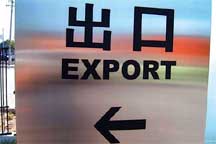 (Exit)
(Exit)
 (Baggage
storage room)
(Baggage
storage room)
 (Parking
garage)
(Parking
garage)
 (Staff only)
(Staff only)
 (Spell
check?)
(Spell
check?)
- [086] Jill Carroll
(1/23/2006) For background, see Newspapers Mix Pleas and Prayers for Kidnapped Reporter's Return
by Joe Strupp at Editors & Publisher. The Monitor today linked online to four of her previous Iraq reports in which the reporter strives to show the plight of regular
Iraqis (comments are by Monitor's Middle East editor Michael Farrell):
- Ordinary Iraqis bear brunt of war
-- Mike says, "Jill was passionate about this story, one of the first she filed for us. For her, it was one of the most important to tell about the war in Iraq. And this particular piece led to an outpouring of financial contributions for Zeinab Yasseen and her family from Monitor readers. It was one of those pieces that made an immediate difference."
- Old brutality among new Iraqi forces
-- "Long before revelations of secret prisons in Iraq's Ministry of Interior, Jill was reporting on allegations of increasing brutality within some the country's security forces," says Mike. "It was her ability to find trusting sources that put her on the leading edge of this important story."
- Sectarian strife tears at neighbors
-- Mike says that "Jill is well aware that traveling around Iraq is dangerous for journalists. But what she often talks about is how dangerous Iraq has become for its ordinary citizens. Especially if they wander into the wrong neighborhood. Here she writes about how the growing sectarian divide in Iraq has led to neighborhoods segregated along religious lines."
- What Sunni voters want
-- "Before Iraq's Dec. 15 parliamentary election, Jill was embedded with the marines in the mostly Sunni Anbar province. On routine patrols through villages around Huseybah, she used her Arabic language skills to speak with people on the street about what they hoped to achieve in the upcoming election," according to Mike. "Unlike the vote for the interim parliament, this time Sunni Arabs were planning to come out in force to the polls. And in this story, Jill and her colleague Ilene Prusher revealed that while Sunni Arabs might be joining the political process, many of them were not turning away from supporting the antioccupation insurgency."
Memoirs of a Geisha, the hit film based on a best-selling book, has run into trouble in China, home to its leading actresses. Prompted by fears that it will further inflame already rampant anti-Japanese feeling, Chinese film censors have cancelled the planned release of the movie next month.
China's two most famous actresses, Zhang Ziyi and Gong Li, play the leading roles in the film, which was initially approved by the censors. But the state-run Film Bureau has changed its mind. Mao Yu, director of the bureau's propaganda and publishing section, believes
Memoirs poses "complex" problems and is "too sensitive". ...
One blogger said: "She's sold her soul and betrayed her country. Hacking her to death would not be good enough." Other bloggers claimed that casting of Zhang as the geisha Sayuri is the equivalent of a Jewish actress playing a Nazi.
With Sino-Japanese relations at their lowest point in decades, the authorities are worried the film will revive lingering resentment over the Japanese treatment of Chinese women before and during the Second World War. Tens of thousands of women were raped by Japanese troops during the infamous Nanjing Massacre in 1937. Thousands more were among the estimated 200,000 Asians forced to work as "comfort women" in Japanese military brothels during the war.
So the Internet gets blamed again for inflaming passions?
Meanwhile, in Hong Kong, the movie Memoirs of a Geisha has opened
to little fanfare. There was much more interest in The Chronicles
of Narnia (see Alison Lurie's review).
- [084] Elementary School Services
(1/22/2006) The following is a widely circulated advertisement known
to be a joke (see 6Park):
本人长期代写小学生寒、暑假作业,替小学生欺负其他同学,代替学生父母开家会……收费标准:
寒假作业:(48页1-3年级)10元(48页4-6年级)12元
暑假作业:(62页1-3年级)12元(62页4-6年级)14元
欺负同学:(身高1.3m-1.4m)15元 (1.4m-1.6m)18元
(1.7m-1.9m)价格面议
打老师:女老师(25元) 男老师(30元) 校长(40元)
体育老师(价格面议)
代开家长会,一律20元
[in translation] I offer regular service for elementary students to do their
summer/winter vacation homework, beat up other students, pose as your parents
to meet with teachers.
My rate card is as follows:
Winter homework: (48 pages grades 1-3) 10 RMB; (48 pages grades 4-6) 12 RMB
Summer homework: (62 pages grades 1-3) 12 RMB; (62 pages grades 4-6) 14 RMB
Beat up schoolmates: (height 1.3m-1.4m) 15 RMB; (height 1.4m-1.6m) 18 RMB;
(height 1.6m or taller) price subject to negotiation
Beat up teachers: (female teachers) 25 RMB; (male teachers) 30 RMB;
(principal) 40 RMB; (sports master) price subject to negotiation
Pose as parents to meet with teachers: uniformly 20 RMB
社會運動中人的陋習,人皆見之,敵我分明,立場重於一切,然而,置身其中,當知其難;這次批評星島,並非自然反應,起源卻是一位不甚參與遊行示威的本港著名blogger,有人憤怒,但主要聲援團體HKPA其實沒有時間理會,韓農雖覺老屈,但不太介懷,只是一眾參加開遊行的朋友,兼一群不知何處跑出來的人,深感憤怒.
[in translation] A bad habit of people involved in social movements
is well known -- your position is everything and it is clear who the friends
and enemies are. If you are involved with this, you will know how hard
it is. But the criticism against Sing Tao was not a spontaneous
reflex. It began with a certain blogger who does not usually
participate in demonstrations. Some people got very angry, but the
principal support group HKPA did not have the time and energy for it.
The Koreans felt aggrieved, but they did not mind much. So it was up
to the people who are regular demonstrators plus another bunch of people who
came out of nowhere to express their anger.
So it is up to me to explain how I got this reputation of not
participating in demonstrations. I am of an age that would make me a
lot older than the blogging generation out there. In my youth, I have
personally witnessed social movements such as the I Wor Kuen, Asian
Americans For Equal Employment, the Diaoyutai defense, the Cultural
Revolution, the Red Guards, Vietnam war protests, etc. With due
respect, every movement that I have seen was eventually hijacked for other
purposes. Come to think of it, I have even personally hijacked some
movement for completely different purposes.
Today, I will still go and demonstrate for a cause. But I will be
damned if I let someone else hijack my presence and use it for some other
purpose. What do I mean? The following is a photo from the
December 4, 2005 march in Hong Kong. Take a close look at the banners.
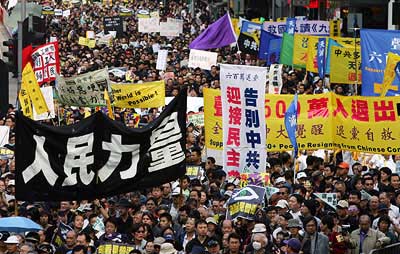
While I may march for "People Power," I'll be damned if I am going
to celebrate the 'fact' that 6 million Communist Party members have resigned
because they heeded the call of a certain 'cult.'
You can see a lot more examples at my own photos of the 2005
7/1 March. The organizers said that that 21,000 persons
marched to support universal suffrage and to condemn government-business
collusion. Meanwhile, I can count 2,000-3,000 South Asian domestic
helpers for whom universal suffrage and government-business collusion cannot
possibly be more remote from their minds (note: they will probably get a pay
cut if universal suffrage were in place when the popular opinion of Hong
Kong voters really mattered). Also, how shall I reconcile that 21,000
persons marched for gay rights and 21,000 persons marched against
homosexuality? They can't be both true and the only truth is that
21,000 persons served as propaganda material.
Pardon me for being cynical -- these large demonstrations are exercises of
mutual exploitations. The organizers have a particular axe to grind,
and other groups leeched themselves onto the cause even if they have no
affinity for that stated cause but they wanted to showcase their own issues
along the parade route. I won't object to a carnival parade in which
everybody celebrated their own individuality, but I do object to seeing the
press releases about how everybody (and absolutely everybody) marched to a
particular cause on that day.
So if they want to hold a candlelight vigil against Sing Tao for that
particular article, I will be there. But if someone wants to bring up
government-business collusion, I'll leave. If they want to hold a mass
rally for universal suffrage, I refuse to be tallied as supporting the Nine
Criticisms, or objecting to the use of Li Ka-Shing name for the Hong Kong
University School of Medicine, or advocating the right of the Taiwanese
people for self-determination.
This is not an unusual sentiment in Hong Kong. In a sense, this is the
big elephant in the house that nobody wants to talk about. To see this
point, you will have to reconcile how a majority of the people support
universal suffrage according to public opinion polls but a much smaller
proportion shows up for demonstrations. You may think 100,000
demonstrators is a big number, but the public opinion polls suggest that the
support level is more like three or four million. Why won't the rest
of the people come out? I assert that they won't for the same reasons
why I won't.
For another example, check out InMediaHK.
Here a demonstration by the Hong Kong Professional Teacher's Union is represented by
this picture at Tai
Kung Po with a banner of the DAB political party. Was that the
reason why the demonstrators went out there for?
- [082] A Cartoon
(1/21/2006) This is from David
Horsey, Seattle Post-Intelligence (1/19/2006):

- [081] The Case of Zhang Dejiang
(continued) (1/21/2006) The people inside China get this even
though the usual American expats never will.
Evidence #1 -- In The
Case of Zhang Dejiang, you can scroll down to find the translation of
Guo Feixiong on January 21, 2006. His point is this -- if Zhang
Dejiang is willing to make those firm statements, then he will be held to
whether he can make them happen. That was exactly my point.
Zhang Dejiang has gone out and made a bunch of very strong statements (such
as the Three No's (=three stern demands) about land
requisition/compensation). If he can't deliver, then he won't survive;
if he can deliver, then this is everything that the people would want anyway
and they will forget about moral retribution against him. They don't need another
faceless bureaucrat with no track record and with whom everything has to
begin all over again.
Evidence #2 -- In The
Zhongshan Incident, you can scroll through the English-language coverage
to the SCMP report on January 21 by Kristine Kwok:
Holding a photocopy of a news clipping dated January 5, a resident of Sanjiao township in Zhongshan jabbed his finger in the air.
"I want to ask [provincial party secretary] Zhang Dejiang what he really means by the
'three stern demands'? How could the police beat civilians who just asked for what they deserve?"
The news clipping was one of the front-page editorials published by Guangdong media last month hailing a speech made by Mr Zhang. In the speech, he demanded provincial officials observe three rules when overseeing land requisitions, one of which states building cannot start until farmers have been paid full compensation.
Isn't this a superior strategy to: "We will not talk unless Zhang
Dejiang is removed"?
- [080] Amardeep's Response to The
Standard (1/20/2006) In Hong Kong Confidential (January 14,
2006, The Hong Kong Standard):
Radically happy Apparently Hong Kong's radicals aren't radical enough for the real radicals. A Web site calling itself "Target: WTO - Derail, Dismantle, Destroy!" carries an open letter to the Hong Kong People's Alliance, accusing the HKPA of timidity and accusing them of siding with the police at the WTO confab. "How can the HKPA legitimate the police force, negotiate and follow all rules set out by the police and the HK government when they are protecting the most illegitimate institutions?"asks an activist named Amardeep. He also had concerns about the lack of direct action on the march. Tuesday's festivities, including the pepper spray, should have cheered Amardeep up.
In My Response to the Standard's Outrageous Representation,
Amardeep responds:
First of all - I, Amardeep, am not a man; I am a woman. Clearly, this person from the Standard who wrote this article did not interview me.
Secondly, the author took one quote from my two- page open letter to justify that I accused HKPA of timidity by not being direct action enough. At no point in my letter did I view HKPA to be an organization of cowards.
Thirdly, I wrote the letter about a week before the MC6. Where did this author get the following idea of my feelings of the march that happened on Tuesday, Dec 13th: "He also had concerns about the lack of direct action on the march"? The author has made unqualified facts and feelings of people in the article to drive his media propaganda.
Fourthly - NO! Pepper Spray did NOT cheer me up! It did anything but cheer me up. In fact on Friday, December 15, 2005, I was with the women's march helping deliver Pepper Pig Stomach Soup for WTO's cold-blooded exploitations. Maybe I should reiterate our (women's) statements, "Pepper, is for soup, not for abuse." I assert woman's right to food soveriengty.
- [079] Rule of Law: Hong Kong vs.
China (1/20/2006) A mass incident occurred yesterday in
Shenzhen, across the border from Hong Kong (see Mass
Incidents In China). In Shenzhen, here is the
time line: 10am, four men led others to charge the police line, were
arrested and taken away; 1030am, police told people to leave or else be held
responsible for consequences; about 4,000 out of 5,000 left; 11am, police
brought in 20 buses and started to remove the 1,000 remaining demonstrators;
11:40am, the street was cleared and opened to vehicular traffic again; by
the evening, 25 demonstrators were detained for 15 days and the rest were
released.
By comparison, it took eleven hours for the Hong Kong police
to remove 900 plus demonstrators, who were then held for 48 hours.
Why? You can choose among inefficiency, vindictiveness or tactical
delay as the answer.
P.S. The Shenzhen police did not let people with Shenzhen hukou
(=residency) just walk away.
- [078] Secret Weapons of Chinese
Police (1/20/2006) Richard McGregor (FT.com):
China announced late last year a significant strengthening of the People’s Armed Police, a paramiltary group used to quell disturbances.
The PAP has also bolstered its firepower by acquiring what the local media calls “super-weapons” from Israel, advanced guns bought at Rmb120,000 a piece.
What "super-weapons"? From Netease,
here are the photos of the 120 Rmb120,000 gun that can shoot around the
corner. Actually, it isn't even a gun because you have to supply your
own pistol.

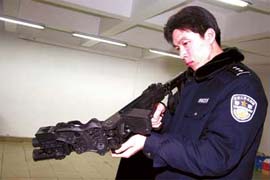
Here are photos of the other weaponry in the Rmb10 million acquisition for
the Beijing Public Security Bureau. A total of 12 police officers will
be trained to used them.


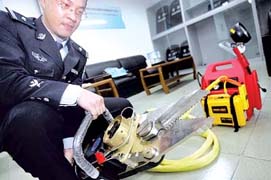
Both FT.com as well as The Sun (Hong Kong) referred to these weapons in an
article about mass incident statistics. It should be clear, though,
that these weapons are not appropriate for coping with mass incidents.
If the problem is 10,000 people in the street, there is no need for that
power wedge (middle photo above) to break down a door lock.
"Microsoft, Yahoo and others are helping to institutionalize and legitimize the integration of censorship into the global IT business model,'' said Rebecca MacKinnon, a former Beijing bureau chief for CNN now specializing in Web censorship.
It's all futile, though. China will find it harder and harder to police fast-changing technologies and fast-learning bloggers. All Chinese consumers may remember years from now is how the biggest names in technology once helped keep them down. Along with a Chinese firewall, they may be creating barriers between themselves and future users.
I'd like to see the country's consumers boycott Yahoo, Google, Microsoft and others. It's just not clear that the message would reach many in China.
Okay, let's supposed that the Chinese consumers heed William Pesek's
call and boycott Yahoo, Google, Microsoft and others. They don't
have to use MSN Spaces because they know that they always have Chinese blog
service providers such as blogcn and bokee. Here is an interview with Hu Zhiguang,
founder and chairman of blogcn (Business
Week):
Q: What do you think is the biggest difference between the blogosphere in the U.S. and in China?
A: The difference between China and the U.S. is quite large. The U.S. has many famous bloggers, and they have a big influence. In China, because of the political environment problem, it's not possible to have that sort of thing.
So [Chinese blogs are] more lifestyle- and entertainment-oriented. But Chinese bloggers are more willing to express themselves than American bloggers. Because elsewhere in America there's more freedom, so the methods of expression are more [varied].
Q: But, as you say, the political environment in China means there's a lot that people can't express in their blogs.
A: Sometimes there are people who write about Taiwanese independence and the Falun Gong.
Q: And what happens when they try to do that?
A: We set up keywords for our programs, like "Falun Gong," and when you type in those keywords, you cannot post them. It just shows up as stars. Everybody has that.
Q: People can avoid using those words, though.
A: The problem exists, but it's not a big one. We can immediately fix it, and it's not a problem. Maybe there are some words that aren't in the keywords, but if they're published, they don't fit the content. Then the Internet police will call us, and we will delete it within 24 hours. If it lasts on the site too long, then maybe it will make some trouble. Maybe I will have to go to the police station.
Q: How often have you had to do that?
A: That has never happened. The phone calls seldom happen - it's only four or five times in two years. We have a specialist who takes care of this. These people [who post the forbidden things] are not real bloggers. They know it will be deleted.
So now do you think freedom and democracy
will arrive as a result of Chinese consumers boycotting Yahoo/Google/Microsoft and
using blogcn instead?
I ask once again: for the next person who
wishes to comment or make proposals on this subject, please explain how the Chinese
Internet users will be substantively better off as a result of your
recommendations.
Meanwhile, for Americans, if MSN, Yahoo and Google are so evil, why don't you
boycott them? That is the question that the Chinese want to know.
Are you standing in solidarity with the Chinese or not?
- [076] Front Page Photos
(1/19/2006) On the feature story in Sing Tao, there are photos of Hong
Kong transport chief Sarah Liao and Kowloon-Canton Railway Corporation
chairman Michael Tien. From the photographs alone, you know that the
story is grim (in terms of their respective careers; see The
Standard for the details).
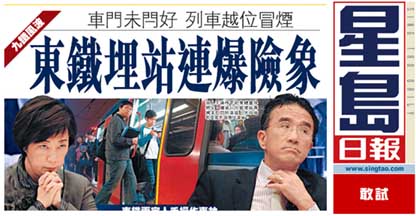
This gets back to the main point from The Sling Shot
at the Hong Kong WTO. There must be thousands and thousands of
photographs on file of Sarah Liao and Michael Tien. Somebody at Sing
Tao sorted through them and found two that fitted the mood and thrust of the
accompanying written article. The words 'neutral,' 'objective,' 'fair'
and 'accurate' have nothing to do with these decisions.
- [075] China New Youth Magazine
(1/19/2006) From RTHK:
Two journalists in eastern China have been jailed for ten and six years for publishing an unauthorised magazine that exposed local land disputes. Court officials in Zhejiang province said the men were also charged with illegal business operations and fraud. The Beijing Times says the magazine, "New China Youth", was registered in Hong Kong in 2002 but this had no validity on the mainland. Last month, a Xinhua news agency report said the journalists had threatened the local government that they would publish stories if the peasants' demands were not met.
Hmmm? What do you think? Is this the usual big bad China
story? For the details about what was happening with New China
Youth, please see the previous post: How To Get Rich As A Reporter In China.
Will Reporters Without Borders fight for the two journalists?

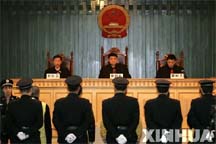
- [074] Page View Statistics
(1/19/2006) In the final analysis, they don't mean anything for the
simple reason that I can manipulate them at will. But of course, this
would be an insult to the people's intelligence and some people know enough
to avoid the trap as well as resent you for the cheap trick.
Case Study: I had a sensational set of photographs about Eating Cats in China.
I could have posted the standard GORY warning and routed people directly to
the photograph page. That would be one page view. Instead, I set
up the standard GORY warning, I routed people to an introductory
page most of which is presented in French and there is a link
at the bottom of that page to the set of photographs. That should get
me two page views (one for the teaser and one for the sensationalsim)
instead of only one. In truth, there were more than 10,000 page views
to the photographs but a much smaller number to the introductory page.
Blog traffic is driven by referrals, and the referrers have enough sense to
bypass the introductory page and bring people directly to the photographs.
Why would anyone want more page views? If your blog sells advertising
space based upon page views, you would want as many as possible. And
there are cheap and artificial ways of boosting that figure just as I have
shown. But your referrers will catch on, and they will also lose a
little respect for you in the process for wasting their time. I agree
with them most of the time but I obviously felt differently in the case
about eating cats. The waiting and the accompanying tension were my
intended effects.
- [073] The Shenzhen Supermarket Bomb
Blast (1/18/2006) Would you believe it was solved in 12
hours? Here is the original report (Shanghai
Daily): A bomb blew up in a Carrefour supermarket in Shenzhen, southern China's Guangdong Province, the Nanfang Metropolis News reported yesterday.
The bomber or bombers made undisclosed demands, and police classified the case on Monday afternoon as blackmail, the Guangzhou-based newspaper said. Three other supermarkets were threatened.
Nearly 1,000 customers were evacuated at Carrefour as dozens of policemen cordoned off the scene and searched for other bombs. Police later detonated a second bomb found in the store, the report said.
(Nanfang
Daily) (in translation) First about the technology: it was a
small bottle of black powder (probably stripped from firecrackers) placed in
a storage locker and set off by a timer which consisted of a
mosquito-repellent incense coil burning down. Now about the demand:
23,500 yuan paid to a designated bank account. Hmmm ... the police
immediately got a hold of the bank account holder's information and a record
of his withdrawal locations and habit. The suspect was found playing
an online game at an Internet bar. Upon interrogation, the suspect
gave away his two co-conspirators. Hmmm ... not exactly rocket
scientists.
- [072] What Is Nancy Kissel Doing
These Days? (1/18/2006) Well, wouldn't you want to
know? According to Apple
Daily, even before the judge sentenced her, she was behaving
unusually. Most of the time, she said nothing but she got the prison
personnel to give her towels so that she can repeatedly wipe the floor next
to the bed. She was sentenced to life in prison. She is serving
at the Tai Lam Women's Prison in a Category A cell. She eats, drinks
and works with the only other three female 'lifers' of Hong Kong.
According to a Mental Health Guidance Association consultant Dr. Lau Li-san,
a repetitious sequence of actions (such as handwashing) which gets to the
point of interfering with normal life is usually a sign of
obsessive-compulsive disorder.
- [071] Demonization of the Japanese
(1/18/2006) The collection of photographs at Anti-Japanese Print Advertisements in China
does not reflect the ESWN blogger's sentiments at all. What struck him
as an advertising/marketing professional is that some people have spent a
lot of time doing this kind of stuff for whatever reasons and he only wants
to document those efforts. The blogger has stated many times that he
is not anti-Japanese per se and there are plenty of people in China
who feel the same way.
Here is a translation of the conclusions of one essay (a Shenzhen forum post
via Boxun):
(1) Are we demonizing Japan? Answer: Yes.
(2) What is the consequence of demonizing Japan? It is just as bad as
America demonizing China -- it will only antagonize the Japanese people.
(3) Why are we demonizing Japan? Answer: I can't think of any real
reason. Maybe we are losing our minds. Worse yet, we may be
sinking into depravity.
Example: The sign says: "W.C.: Japanese not allowed to
enter." The words on the left say that we won't beat you and we
won't scold you; instead we will just make sure that you die when your
kidneys explode ...
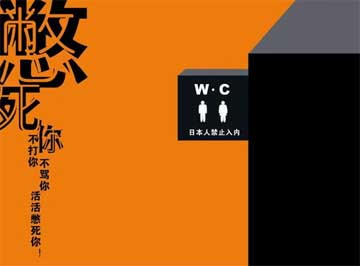
- [070] The Oscar Dream
(1/18/2006) "The
Bloody Case That Started From A Steamed Bun" is turning out to
be an extremely popular Internet movie with hundreds of thousands of links
on Baidu and Google. According to this forum post, there is a sequel
that will merge Chen Kaige's The Promise with Zhang Yimou's Hero.
Here is the summary of the plot: Twenty years after Nicholas Tse gave a
steamed bun to Cecilia Cheung, Hiroyuki Sanada became a movie director and
Cecilia Cheung and Jang Dong-kun are the actors. They wanted to take a
movie titled "The Steamed Bun Murder Case" for the Oscars but they
had financing problems. Hiroyuki Sanada went to beg people everywhere
but he had all kinds of problems. The characters in Hero made
their appearances as various motion picture professionals. Thus, Jet
Li was Hiroyuki Sanada's assistant, Tony Leung and Chen Daoming were
investors, Maggie Cheung was a bank CEO and Zhang Ziyi was Tony Leung's
secretary ... finally, after Hiroyuki Sanada agreed to launder dirty money
for Chen Daoming, the movie was made and it was ready to win the
Oscar. But at the last moment, the director of the National Movie
Review Board Nicholas Tse showed up and declared that this movie has not
passed inspection and therefore will not be able to participate in the Oscar
Awards. Thus "The Steamed Bun Murder Case" failed to win an
Oscar.
- [069] The Most Difficult To
Understand Chinese Dialects (1/17/2006) This 6Park
forum post has the following rankings (from the most difficult down):
(1) Wenzhou -- During the Eight Year War Of Resistance Against Japan, the
Communists often needed to communicate by telephone or radio, which the
Japanese could listen in on. So they always used two Wenzhou person to
talk. None of the Japanese or their Chinese collaborators could
understand what Wenzhou people say. The comparable example might be
the Comanche and Navajo Indian communication specialists in the US
Army during the Second World War (see Code
Talkers).
(2) Guangdong -- They have their own pronunciation and writing
systems. On public transportation in Guangzhou, the announcements are
made in Guangdong dialect first before putonghua. Some
Guangdong and Hong Kong people don't even understand putonghua.
(3) Minnan -- This is a transborder dialect that has traveled to Taiwan and
Southeast Asia.
(4) Suzhou -- The most important characteristic is that it is soft sounding,
especially when spoken by females. It is said that you would rather
quarrel with someone from Suzhou than hold a normal conversation with
someone from Ningbo.
(5) Shanghai
(6) Shaanxi
(7) Changsha
(8) Sichuan
(9) Shandong
(10) Tianjin
(11) Dongbei (Northeastern)
- [068] Power Politics and the Fake Map
(1/17/2006) You can proceed to SimonWorld
and read about the map that allegedly proved that the Chinese beat Columbus
in discovering the Americas. Here I want to pursue a different angle
-- since this is China, everything (no matter how remote) eventually drifts
back to contemporary politics. At the Chinese-language blog post (blog-city
and ZonaLatina.com)
by Michael Anti, he wrote that he asked Liu Gang in person -- the entire
premise of the case is based upon the self-declaration written on the map;
if that writer was lying, then the whole case collapses. Liu Gang
replied that the writer used the word "subject/servant" (臣)
to describe himself, so this map was being presented to the Emperor. It
is a serious crime to lie to the Son of Heaven ("灭九族":
meaning that all members of your extended family would be put to death).
The writer had no reason to take such a huge risk and so he must be telling
the truth.
Here, the ESWN blogger had to start laughing. Let us time-shift to the
Great Leap Forward and village mayors were claiming that they had produced
5,000 kilograms of rice in one "mu" of land. It was a serious
crime to lie about production statistics (=economic sabotage). "The
mayor had no reason to take such a huge risk and so he must be telling the
truth"? Of course, the power politics is that the underlings say
things that they think will please the bosses, who don't seem to object.
The mapmaker as well as the mayor saw no risks and plenty of rewards.
- [067] The Suicide Blog Posts
(1/17/2006) (Apple
Daily) Yesterday, three young girls rented a room in Cheung
Chau (Hong Kong) and attempted suicide by carbon monoxide poisoning.
Fortunately, two police patrol men received information from the people in
the neighborhood and saved them in time.
One of the girls kept a blog. In her blog profile, her nationality was
"The loveless sky (沒 有 愛 的 天 空
)" and her street is "Is it wrong to love you? (愛 你 有 錯 嗎 ?
)." The entries were (in translation and in the original:
- 1.13 (one day befoe dying) What is better than dying? Death is the
only solution! Sorry ... ( 1.13
( 死 前 最 後 一 日 ) , 有 咩 比 死 更 好 ? 死 係 唯 一 可 以 解 決 的 辦 法 ! 對 唔 住
… …).
- 1.14 (day of death) ... farewell to my many friends!!!! ( 1.14.
死 忌
… …
再 見 啦 咁 多 位 朋 友 ! ! ! !)
People read those blog posts, and some have even heard from the girl in person
that she wants to die. But people did not know how to deal with the
situation, and they were afraid to ask the adults for help. Generally,
this is not an easy call because it will have to depend on how specific the
information is. The entries translated above are ambiguous, but not this
one: "Mom and dad, younger brother, paternal grandpa and grandma,
maternal grandpa and grandma, SORRY ... I won't be able to care care of you
... all the friends, SORRY! I hope that you will remember after I am
dead!" (媽 咪 爹 、 細 佬 、 爺 爺 、 公 公 婆 婆 ,
SORRY … … 唔 可 以 再 照 顧 你 啦
… … 所 有 FD
( 朋 友 ) SORRY
! 希 望 我 死 後 你 可 以 記 住 我 ! )
- [066] The Odd Man Out
(1/17/2006) On December 18, 2005, more than 900 people were arrested
on the charge of illegal assembly in Wanchai, Hong Kong during an anti-WTO
demonstration. In the long translation Hong Kong Detainee Number SAF02518,
you can read about what happened to one individual Taiwan citizen for whom
there was apparently no cause for arrest. It is known that out of the
900 plus arrestees, 14 were charged at first for illegal assembly.
Among the thirteen were 11 Koreans, 1 Japanese, 1 Taiwanese and 1
Chinese. Of these, the Chinese person Wen Zhiming (文志明)
must be considered the odd person out because the Chinese are not known for
international (or even intra-national) travel to demonstrate.
In the comment Hong Kong On Trial In Mainland,
I translated part of Chinese blogger Michael Anti's post: "According to informed sources, Mr. Wen Zhiming (文志明) was arrested by mistake. He and his Hong Kong girlfriend had dinner in Wanchai. When the police blocked the road and checked the thousand or so arrestees, his girlfriend was released because she was a Hong Kong resident but he and
thirteen others were charged. According to the informed source, Mr. Wen did not personally participate in any anti-WTO activities ... we hope that the Hong Kong court can fairly treat this mainlander Mr. Wen and we also hope that the mainland media will pay attention to his fate."
We now know that Wen Zhiming's case was dismissed three weeks later due to
insufficient evidence. What happened? Wen Zhiming has not
published his own account. Another Taiwan citizen Wei Hong (衛紅)
wrote at length about his own 48 hours at the Cheung Kwun O Police Station in Part
1, Part
2, Part
3 and Part
4. It turned out that Wei Hong was a cellmate of Wen Zhiming and
I have translated loosely the relevant sections below.
... The police used Cantonese to tell us to stop outside this room,
leave all our stuff on the outside and then go in to be searched.
I said, "Undo my handcuffs!" because I couldn't remove my
stuff otherwise. The policeman looked at me in surprise and it was
clear that he was unprepared for this. So he asked another police
officer to get some tool, and this other person brought back a tiny
craft knife with a blade about 0.5 cm long. Then he tried to slash
and drag at the plastic cuff, and even wanted me to get out of my own
cuffs by myself. Then it was the turn of the mainlander Wen who
yelled: "Be careful about my clothing! They are brand name
products!" Then those two had a quarrel conducted in
Cantonese, which was basically about how the Hong Kong police arrested
people for no reason. While they were quarreling, I stuffed
everything on me -- headband, slogans, passport, digital camera -- into
my bookbag.
Bang! The cell door was slammed shut. The mainlander asked the
police to give him a blanket. "Later," said the
policeman. After a while, Wen's blanket came. We introduced
ourselves to each other. The American said: "I am
American. My name is Sascha. I work as a reporter in
mainland China and I came here by myself. I did not apply for a
reporter's pass." The Japanese said: "I am
Yukihiro. I work for a Japanese labor website." The
mainlander Wen said, "I am a tourist. Look at me. I
don't even have my jacket here, beacuse I let my Hong Kong friends take
it. I told them to leave first, because I thought that I could get
out immediately. I didn't imagine that Hong Kong would be even
more Chinese than China!"
... During the day, Wen spoke with the police in Cantonese and found
out that they said that we could leave soon because the females have
been released already. Wen Zhiming translated the conversation
into putonghua (Sascha was very good in Chinese), and then I
translated it into English for Yukihiro.
... I chatted with Yukihiro about media and websites, and then I
chatted with Wen about "one country, two systems" and the
problems of going across borders.
... At around 7pm at our cell, Wen was asked by the police: "Are
you the one from China? Get up and come out!" We
embraced with Wen one after another and left the contact
information. He said, "Please come and look me up in
Guangdong!" But Wen would be walking out of this detention
cell only to be charged in court.
I do not know for sure what happened with Wen. The speculation
was that he was selected for prosecution because he was tall and tanned
like a farmer. As a member of the fourteen, there was no specific
evidence against Wen initially. Over the next three weeks, it is
known that the none of the original 80 listed police witnesses identified
Wen (nor any of the other 13 suspects). None of the additional
police witnesses called in for the 'confrontation' line-up (that is, each
witness got to walk up and stare at the 14 suspects in close) picked out
Wen. Therefore, Wen was released.
Was this another triumph of the famous rule of law in Hong Kong?
Well, the rule of law is not just about whether Wen was freed eventually,
but also about why he was arrested and charged in the first instance.
Did the Hong Kong police make an honest mistake, or did they charge these
fourteen people out of political expediency? You should never expect
to get a straight answer even if it seems quite obvious by now.
(Postscript: I expect that the response (if any) is that the police had
the evidence but they cannot tell us at this time to protect the privacy
of the individuals)
- [065] Why Is Kim Jong-il In
Guangdong? (1/17/2006) It wouldn't take too long for someone
to draw the obvious connection. And it is not about the six-nation
discussions, the University Library, the Guangzhou boat tour or the 12 Girls
Band.
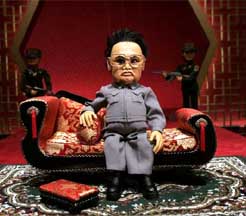
In The
Case of Zhang Dejian, we learned that Guangdong Province Party Committee
secretary Zhang Dejiang's job is on the line after his province generated
most of the internatonal scandal headlines in China for the past couple of
years. This weekend's latest addition is The
Zhongshan Incident.
So what? What has that got to do with Kim Jong-il? The author of
this Boxun
article noted that Zhang Dejiang is a graduate of Kim Il Sung Comprehensive
University and therefore his ties to North Korea are strong. The
author then concludes that Kim Jong-il was making a personal trip to support
Zhang Dejiang's continued employment at the CPC Politburo where he will no
doubt offer continuous support for North Korea. What do you
think? The author noted that this action could easily backfire (as in
branding Zhang Dejiang as an agent for a foreign power). More likely,
I believe that people enjoying piling on Zhang Dejiang -- kick him hard when
he is down!
- [064] The State of Hong Kong
Blogosphere (1/16/2006) This is the translation of Jiang Xun's
section on Hong Kong bloggers in Asia Weekly (issue dated January 15, 2006)
(see The Dukedom of
Aberdeen).
How many bloggers are there in Hong Kong? There are no accurate
statistics, because Hong Kong blogs are hosted by a variety of BSP's
around the world. But it is undeniable that the use of blogs is
limited in Hong Kong, the number of bloggers is relatively small and the
circle of bloggers is not wide. On both sides of the straits and
in the world Chinese community, Hong Kong is a leader in termsof freedom
of speech and adoption of new technology, but its people have less
desire and quality to express with words. The young people of Hong
Kong particularly have been immersed extensively in audio-visual media
and colloquial culture. Therefore they are less interested and
skilled in verbal expression, whereas blogs are primarily verbal in
nature. Furthermore, the blogger spirit is about innovation,
whereas Hong Kong students are used to the force-fed-duck type of
education system and tend to conform. Thus, blogging in Hong Kong
remains to be developed.
There is no point in arguing with this kind of essay. Why
bother? As the Super Girl theme goes -- if you want to blog, just
blog.
- [063] Marketing Ideas
(1/16/2006) This was the first day of the largest migration on the
planet as the Chinese travel back to their hometowns for the New Year.
According to United Evening News (via Boxun),
at a certain supermarket in Shunde city, a migrant laborer named Chen from
Anhui was scrutinising the prices and sizes of the adult diapers. Each
year, he travels dozens of hours back home for the New Year. He said,
"Last year, the train was packed. Even the toilet was jammed full
of people. It was harder to use the toilet than buy the train
ticket. When female comrades had to 'go,' it was really
embarrassing." So Chen was designated by his hometown folks to
buy a couple of packs of adult diapers for use. According to reports,
the Shunde supermarkets are putting adults diapsers on prominent display for
the season.
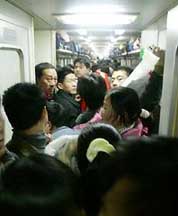
- [062] Carrion Comfort
(1/16/2006) In 1918, Gerald Manley Hopkins wrote the poem titled Carrion
Comfort. Here is the first stanza:
NOT, I’ll not, carrion comfort, Despair, not feast on thee;
Not untwist—slack they may be—these last strands of man
In me ór, most weary, cry I can no more. I can;
Can something, hope, wish day come, not choose not to be.
But ah, but O thou terrible, why wouldst thou rude on me
Thy wring-world right foot rock? lay a lionlimb against me? scan
With darksome devouring eyes my bruisèd bones? and fan,
O in turns of tempest, me heaped there; me frantic to avoid thee and flee?
Alas, I am aged and tired. So when I read the interview How China Controls the Internet
of Nicholas Bequelin, the China research director for Human Rights Watch in Hong Kong,
by Business Week's Bruce Einhorn, I can do no more. Somehow, these
people dwell in a different China than the one that I am in. (Hint:
Go to Technorati, type in some sensitive keywords and see what is on the
MSN Spaces blogs). Anyway, I am confident that there are young and
abled bodies out there who can undertake the job of addressing this
fisking of this interview properly ... go for it!
- [061] Four Types of People In Hong
Kong (1/16/2006) Consider the fact that ESWN posted The Peter Kovolsky
Letter and Simon
World linked to it. That means there are four types of people
in Hong Kong.
Type 1: Those who do not read the South China Morning Post or read
the English-language blogs. That happens to be the majority of the
population and they were, are and will not be relevant to SCMP.
Type 2: Those who read the South China Morning Post as well as the
English-language blogs. There will undoubtedly be a keen sense of
disappointment and it cannot be good for the SCMP in the long run.
This is an erosion in trust against which they have no defense because it is
a totally one-sided affair (unless they want to come out to attack Peter
Kovolsky!).
Type 3: Those who do not read the South China Morning Post but they
use the English-language blogs. This will no doubt be a reinforcement
that they should not be reading that rag because it is evidently not
concerned about the people and their interests. Please remember that
these are the most dynamic and intelligent readers and opinion makers that
advertisers love.
Type 4: Those who read the South China Morning Post but do not read
any English-language blogs. It is true that they will never learn
about the Peter Kovolsky letter. But the trend is that this will be a
diminishing group. Sooner or later, Internet access (and blog reading)
will be nearly universal.
We will have to wait another ten years before we can pronounce judgment as
to whether the South China Morning Post totally lost it or that they were
smart not to succumb. What do you think?
- [060] The Snooker Champion
(1/16/2006) In December 2005, 18-year-old Ding Junhui won the UK
Championship in York, England. In the photo on the left, Ding is
holding a piece of red paper symbolically indicating US$50,000.

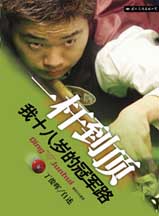
(CNA via ChineseNewsNet)
In an interview, Ding said: "What is the use of studying? When
you graduate, you still have to find a job? If you can't find a job,
you will have to stay and let your parents worry. I feel that people
exist in order to live better. Right now, I am playing snooker and
making money. Things are very good."
You can bet that this started an Internet debate. On one hand, some
netizens condemned Ding for being irresponsible as a public figure and urged
young people not to follow him blindly. On the other hand, some
netizens believe that Ding's example proved that learning is not the only
path to success.
- [059] Filthy Stinking Liberals
(1/16/2006) The responses on the US Congressional Hearings seemed to
be far too homogeneous around here: RConversation,
ESWN, Imagethief,
Danwei, Asia
Pundit. This is the whole problem about Group
Polarization on the Blogosphere in which like-minded people in a group
talk to each other in the same way. So it will do here to bring up a
dissenting opinion: "I absolutely support the action taken by American congresses and senates. Those opposed to these such measure are
dirty, unethical and ummoral liberal who want to support the communist regime under the name of mulitculturalism."
Take that!
- [058] Thieves (1/15/2006)
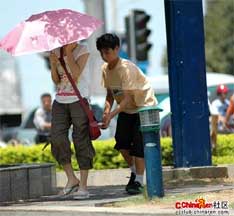

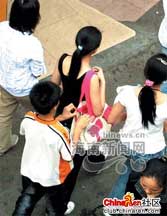
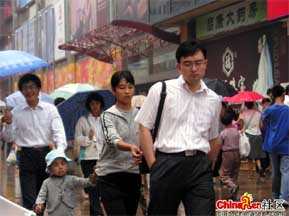

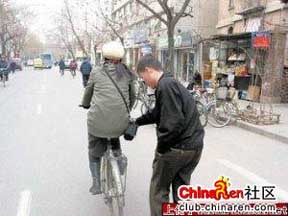
There are more photos at Wenxue
City. But the strangest one is about the thief who hid himself
in a suitcase and had it checked into baggage storage so that he can pilfer
from the other bags.


- [057] The Yao Wenyuan Diaries
(1/15/2006) Unfortunately, we will probably never see them in our life
times. But here is an account from Asia Week (via 天方乱谭):
[in translation] At court, the Gang of Four and more than a
dozen of their colleagues stood in a row. But only Yao Wenyuan
carried a fountain pen in his pocket, which showed why he was Mao
Zedong's writer. He began to keep a diary at age 15, and continued
to write every day through the Cultural Revolution and in prison.
His diary is not just about daily trivia, but it carried his and other
people's viewpoints. In prison, he showed that he seemed to be
honestly reforming himself and he listened to the lectures from the
prison administrators. This was different from the rowdiness of
Jiang Qing or the silence of Zhang Chunqiao. Every day, he read
newspapers and books, he wrote self-criticisms, he talked about his
viewpoints and he continued his theoretical research (especially the
theory of natural dialectics) and make copious notes.
Based upon the news that he read in the newspaper, he made assessments
based upon his understanding and he offered analyses and
suggestions. He asked the prison administrators to forward these
to the CCP Politburo. One time, he read in the newspapers that the
people in the country had plenty of food and clothing, and that the
people were dining and drinking during the Spring Festival. He
appeared to be quite worried because he believed that if this were to
continue, then the food would run out in a few years' time. So
there had to be a plan to restrict the sales of food just like
before. He asked the prison representative to tell the central
government that one must struggle in hardship: "There has to be a
plan about food. We can't just eat like this."
Now this is truly shocking information, because it says that someone in
the top echelon in the 1970s had no idea about how things work -- like not
having to be self-sufficient in everything because you can always
trade. How many such people remain in that system? After all,
Yao Wenyuan isn't that old ...
- [056] The Looting of the Palace
(1/15/2006) ESWN v.1.0 was an actually mostly a War In Iraq blog
site. But these days I have given up talking about that subject.
After all, I meet people and they say, "Freedom and democracy have
arrived in Iraq. They just held an election in December. Bush
will go down as the greatest president in history, even better than Ronald
Reagan." What can I say? Why waste my breath? But
periodically, some stories coming out of Iraq are so striking that they must
be highlighted, as is this one from Ellen Knickmeyer at the Washington
Post:
On Nov. 22, the top U.S. military and civilian leaders in Iraq handed over Saddam Hussein's most lavish palace compound to the safekeeping and control of the new Iraqi army and government, in a ceremony whose intended symbolism was as impossible to ignore as the military brass band.
"The passing of this facility is a simple ceremony that vividly demonstrates the continuing progress being made by the Iraqi government and their people," said Col. Mark McKnight, commander of 1st Brigade Combat Team, 3rd Infantry Division, who handed the keys to the palaces to the governor of Salahuddin province.
But in the days after American forces and the Iraqi brass band pulled out of the circular palace drive on a bluff overlooking the Tigris River, local officials now say, looters moved in, ripping out doors, air conditioners, ceiling fans and light-switch plates from some of the compound's 136 palaces, leaving little more than plaster and dangling electric wires.
... "The palace was turned over to the Iraqi army units in the presence of Deputy Governor Abdullah Naji Jabara,"
[Gov. Hamed Hamood Shekti] said. "Two weeks later I heard the place was looted. Now who can I accuse of the looting?"
U.S. military spokesmen, some expressing surprise, said this month that they had not known of the alleged looting spree after the handover. They stressed that the Tikriti palaces, after Baghdad's Green Zone the most prominent U.S. installations eventually slated for return to Iraqi authority, were no longer U.S. troops' concern.
"I think what we're seeing as we're able to leave the areas and turn them over to the Iraqi government, we're giving more responsibility back to the Iraqi government," said Lt. Col. Barry Johnson, a U.S. military spokesman in Baghdad.
...In Washington, the Bush administration trumpeted the handover. "The Iraqi forces are becoming more capable on a daily basis, and so this was, I think, an important example of that process moving forward," State Department spokesman Sean McCormack said that day. "It was, I think, symbolically important that this was a handover of one of Saddam's former palaces that he built in his home town, and now Iraqi forces that truly represent the will of the Iraqi people are now going to have control of that palace."
- [055] The Jiang Zemin Reverse Sting
According to Ming
Pao, nine people in Hong Kong have fallen for the Nigerian 419 scam
over the past two years for a total loss of HK$3.7 million. According
to Ming Pao,
an Englishman named Elliott Hambrook working in mainland China received an
email from 'Alex Guei' concerning the 'fortune' worth HK$230 million from a
deceased west African general. Hambrook promptly replied using the
name of Jiang Zemin to indicate interest and also informed the Hong Kong
police.
A meeting was set up with two representatives of the 'Eastern Asia
Diplomatic Services' in a Wanchai hotel, at which point two police officers
posing as Jiang Zemin and his secretary signed the receipt. When the
police officers identified themselves, the first defendant ripped up his
EADS 'identification' card and attempted to flush it down the toilet.
The police was able to retrieve only parts of the evidence. The two
suspects were identified as 28-year-old Jean Agbegnon Kondo and 29-year-old
Oriakhi Oje from Togo and Liberia respectively and are illegal immigrants in
Hong Kong. Yesterday, the two people admitted to conspiracy to commit
fraud, possession of false documents, illegal entry into Hong Kong and
assaulting police officers. They were sentenced to 26 and 27 months in
jail respectively.
This leaves an open question: Why Jiang Zemin?
- [054] 我的态度:关于微软事件和美国国会可能的立法
(Blog-City (not
viewable in China) with mirror at ZonaLatina.com
(viewable in China)) "My attitude: The Microsoft incident and the
Possibility of Legislation by the US Congress." Partial
translation:
As for what the US Congress Represenatives want to legislate, this is
totally the business of the American people. I don't feel that the
freedom of speech of the Chinese people can be protected by the US
Congress. If the freedom of speech of the citizens of a great
country has to be protected by the legislature of another country, this
shows how distant the country is from the greatness that we longed
for. Opposing the shutting down of my blog and my defense of my
freedom of speech should not be based upon relevant legislation by the US
Congress.
To state it more clearly, we want legislation from China's
Congress. We want the Chinese to defend the freedom of speech by
the Chinese. Maybe not today, but it will be possible
tomorrow. This is the only glory and dream for continuing to live
on. ...
Furthermore, at a time when globalization and politics are mixed up,
I do not think that we can treat everything in black-and-white terms as
being for or against the improvement of freedom and rights for the
people of CHina. On one hand, Microsoft shut down a blog to
interfere with the freedom of speech in China. On the other hand,
MSN Spaces has truly improved the ability and will of the Chinese people
to use blogs to speak out and MSN Messenger also affected the
communication method over the Internet. This is two sides of the
practical consequences when capital pursues the market. How the
Americans judge this problem and mete out punishment is a problem for
the Americasns. If they totally prevent any compromised company
from entering the Chinese market, then the Chinese netizens will not be
freer at least in the short term. Besides, we must distinguish
between the sellout by Yahoo and the compromise by Microsoft, because
they are completely different matters.
El diario de Hong Kong "Sing Tao" utilizó una foto de sobre los disturbios ocurridos en Caracas en 2004 para ilustrar su información sobre las protestas ocurridas durante la reciente cumbre de la Organización Mundial del Comercio (OMC), según denunció hoy el autor del blog informativo "ESWN".
Roland Soong, autor de "ESWN" y quien afirma que fue testigo de las protestas durante la cumbre de la OMC en Hong Kong, el pasado mes de diciembre, denunció en su página web que la foto aparecida en el mencionado diario, de tendencia conservadora, fue tomada en Caracas durante las manifestaciones de la oposición venezolana en febrero y marzo de 2004.
ESWN es uno de los blogs informativos más populares de China y Hong Kong.
La imagen publicada por "Sing Tao" muestra a un hombre cuya cara está tapada con una máscara de gas, usando un tirachinas para arrojar clavos y en el título se explica los manifestantes de Hong Kong usaron ese tipo de armas y "causaron heridos entre la policía".
Con esa foto, "Sing Tao" mostraba su apoyo a las teorías de la policía honkonguense, que aseguraba que muchos de los manifestantes estaban organizados de forma similar a grupos paramilitares y eran muy violentos.
Según sostiene Soong, la foto fue en realidad tomada durante las violentas protestas en 2004 de la oposición venezolana para exigir un referéndum revocatorio del mandato del presidente de Venezuela, Hugo Chávez.
Durante la cumbre ministerial de la OMC en Hong Kong, celebrada el pasado mes de diciembre, más de 1.000 activistas antiglobalización fueron detenidos por la policía local, entre ellos dos españoles, aunque la mayoría eran campesinos surcoreanos.
El blog "ESWN", que en 2005 se convirtió en una nueva referencia para la prensa extranjera en China, destacó que la utilización de esta foto demuestra que hubo "manipulación" sobre las manifestaciones. EFE abc/pdp
- [052] Sing Tao Hits Brazil
(1/14/2006) From the Spanish news agency EFE to the Brazilian news
portal UOL:
O jornal de Hong Kong Sing Tao usou uma foto dos distúrbios de 2004 em Caracas para ilustrar sua informação sobre os protestos que aconteceram durante a recente cúpula da Organização Mundial do Comércio (OMC), segundo denunciou hoje o autor do blog ESWN.
Roland Soong, autor do ESWN e que afirma que foi testemunha dos protestos durante a cúpula da OMC em Hong Kong, no último mês de dezembro, denunciou em seu site que a foto divulgada no jornal, de tendência conservadora, foi feita em Caracas durante as manifestações da oposição venezuelana, em fevereiro e março de 2004.
O ESWN é um dos blogs informativos mais populares da China e de Hong Kong.
A imagem publicada pelo Sing Tao mostra um homem usando uma máscara de gás e atiradeiras e, no título, a explicação de que os manifestantes de Hong Kong usaram esse tipo de arma e "deixaram policiais feridos".
Com essa foto, o Sing Tao mostrava seu apoio às teorias da Polícia de Hong Kong, que garantia que muitos dos manifestantes estavam organizados de forma semelhante a grupos paramilitares e eram muito violentos.
Segundo Soong, a foto foi feita durante os violentos protestos em 2004 da oposição venezuelana para exigir um plebiscito revogatório do mandato do presidente da Venezuela, Hugo Chávez.
Durante a cúpula ministerial da OMC em Hong Kong, realizada em dezembro, mais de mil ativistas antiglobalização foram detidos pela Polícia local, a maioria camponeses sul-coreanos.
O blog ESWN, que em 2005 se transformou em uma nova referência para a imprensa estrangeira na China, destacou que a utilização da foto demonstra que houve "manipulação" sobre as manifestações.
... For whatever the bad news of the week of months in terms of civil
liberties in China, Big Brother is actually already shrinking, and the
space for personal expression is explanding -- constantly. By the
standards of just five years ago, the availability of information and
commentary on the Internet here is mind-boggling.
This is no thanks, of course, to the Chinese government, which is
openly hostile to liberalism and to the ideology of individual freedom
that goes with it. No thanks go either to shameless big American
companies, like Microsoft, Yahoo and others, which help Beijing police
the Internet which disingenuously proclaiming that their presence here,
what their practices may be, is a net positive. ...
Now this is a static model in that the battlefield is regarded as the
world of written words and the weapons of war are emails, blogs, BBS's and
so on. More recently, I am struck by the rapid emergence of
multimedia modes of discourse (that is, with audio-visual elements).
For illustration, here is the blog post 酒后之作 at
the blog 陈晓守的手
("The Hand of Chen Xiaoshou"). At that blog post, you will
find a song sung to some simple animation. The title of the song is
"The Reporter's Song." The song is preceded by some comments
made in a mixture of Chinese dialects, and it is doubtful that any single
person can recognize all of them.
Here is a translation of the lyrics of the song:
In the media world, I am small fry. I hold a sword in my heart
and I stand on solid earth, but when my articles get edited or spiked, I
feel terrible. I work all night until I get pimples on my
face. I look to be doing great, but I am deeply anxious inside; I
don't look old, but my heart is wearied; I feel superior, but my pocket
is tight; I worry about gains and losses, and I keep my worries to
myself. I wake up earlier than the roosters and I go to bed later than
the working girls; I am more tired than a mule and busier than an ant; I
am not starving but I will never get fat; I look inside myself and see
that I am a bit better than the f*cking migrant laborers! Oh, reporter,
this is like a meal without rice; oh, reporter, you are a king without a
crown. "Come on, let's go and play cards?"
"No, I'm writing a report."
Contentwise, this song is not subversive. However, these
multimedia creations will become more and more common and the content will
become edgier in time. The important thing to note is this: there
is no technology from anyone -- Cisco, Yahoo, MSN Spaces or even the
National Security Administration -- that can analyze, classify and filter
these kinds of contents. This will be a major development once
enough Chinese users realize that. This is like trying to attack the
Great Wall with conventional weapons unsuccessfully for so long, and then
comes a new weapon against which the Great Wall is totally porous.
P.S. I have watched/listened to this clip for half a dozen times
already, and I am enjoying it more and more. It is addictive. The long-term
implication for EastSouthWestNorth is that a bridge blog is useless
because such messages can no longer be translated. The original blot
post contains the lyrics and I have translated them. But the effect
is stone cold because I have totally
failed to communicate the humor with the simultaneous presence of
self-deprecation and self-assurance. In that sense, this is the New
China -- people have this sense of imperfection and deprivation, and yet
they are confident and self-assured that nothing can be done to them and
that they will win out in the end.
- [050] The Cat Beats The Sling Shot
(1/13/2006) I just checked the log files to the website.
Notwithstanding my personal preferences, the blog post behind
Eating Cats in China
had several times as many visits than what I considered to be the most
important media event of the year so far at The Sling Shot
at the Hong Kong WTO. This is how the people have voted through
their mouse clicks.
- [049] Desperately Seeking Susan
(1/13/2006) This has nothing to with the movie of that title with Madonna.
Rather, it is about personal ads in search of a specific person. In Chinese, the words are usually 尋人
(xunren). Nevertheless, when you walk around Hong Kong, you
will sometimes come across posted handbills titled 尋丫
(xunya). This is the same thing, except the character for the
person (人)
is inverted (丫).
Why? Those handbills are effectively warnings from loansharks to
delinquent debtors, and in the eyes of the loansharks, the debtor is not
worthy of being human for the sin of being late with their payments and that
is why 'person' is inverted!
More generally, inversion of a proper name usually means contempt. In
reference to the photo of 7-year-old Lee Sin-hang (see comment
#034 or see Sidekick
for a higher-resolution photograph), please note that words for police (警察)
were in fact written upside down in red.

As I predicted, there have been accusations that the poor child is being
manipulated by his parents. That may be the case, and who am I to tell
you one way or the other? But there was one lesson from the flying barbs
and arrows in the discussions, and that is to never assume something that
you have no knowledge about. Specifically, accusations start flying at
Sing-hang's mom Kimmy who has been notably silent in the reports. What
doesn't she speak up herself? What doesn't she appear on camera
instead? Why does she prefer to be the backstage puppetmaster
instead? You can proceed down this road at your own peril and speculate
about the mom. I'll give you a few seconds to do that.
By the way, there is even a video of Lee Sin-hang at one of the
demonstrations. This is a wmv
file that you can download.
Are you ready for the truth about Kimmy? Upon information from people
who know Kimmy, she had a
terrible experience in the past in which she sustained injury and
disfigurement on her lip and she has a speech impediment as a result. For reasons
that you can imagine (for herself and the audience), she does not want to
speak in public. Furthermore, Kimmy's point was that her 7-year-old
son's opinions are in fact more interesting than her own. No, she is
not a bright and articulate flaming professional protestor at all. You
will have to imagine how far off the track some commentators went and how they
quickly fell silent when this information was published.
- [048] Demonizing the Condom
(1/13/2006) (Southern
Metropolis Daily) According to the "Shenzhen Plan To
Implement General Use of Condoms To Prevent AIDS," all hotels, motels,
hostels and inns are required to have condoms in guest rooms; dance halls,
karaoke clubs, bars, teahouses, saunas, gymansiums, footbathing places,
beauty and hairdressing salons must have condoms available for sale;
vacation villages, recreational areas and parks must have condom vending
marchines. The reporter went on a field trip in Lowu on the evening of
January 9 to check up on public places:
- 9:50pm, Great Capital Coffee House. When a female service worker was
asked, she smiled and said: "We don't sell condoms. Why don't you
go to the pharmacy or hotel to buy it!?" This was the first time
she had ever been asked about condoms. "Consumers come here to
drink coffee, relax and meet friends. It seems too much to sell
condoms."
- 10:05pm, New Generation Disco Bar. The two front desk female service
workers looked embarrassed and said no. "No customer has ever
asked. If they need condoms, they would have brought their own or else
they know that if they get a room at a hotel, the hotel will sell it."
- 11:00pm, Waldo Bar. The manager on duty said: "We have a place
for normal consumption. We do not offer sex services, and so we don't
sell condoms. Nobody has ever asked. If they need it, they
should have brought their own." She has no idea that the
government wants them to sell condoms at the bar. "I don't think
there is the need."
According to famous CASS sex researcher Li Yinhe, "This was a wise move
by the Shenzhen government. Even though certain people or
organizations won't understand and they feel awkward at first, this move is
essential because it will save many lives."
- [047] The Slingshot Heard Around The
World (1/12/2006) The story of The Sling Shot
at the Hong Kong WTO will not die. At the bottom of that post, you
can find a copy of the letter from Pranjal Tiwari at In
The Water. Pranjal has
taken the trouble of contacting the people who took the original photograph
and established that Sing Tao had never contacted them to use that
photograph and they would have never ever agreed to it if they knew how it was
going to be used. The Venezuelan Ernesto J. Navarro wrote: "Expreso
mi profundo rechazo a la manipulación de la información para cualquier
fin. Defiendo la libertad de expresión y el derecho de los ciudadanos a
estar informados de forma oportuna y veraz." (in translation: I
express my profound rejection of the manipulation of information for
whatever end. I defend the freedom of expression and the right of citizens
to be informed in an opportune and truthful manner. I reject the use of any
press material for the public that is distorted, and in this way accuses
citizens.).
- [046] Global Journalist
(1/12/2006) One inch forward, one foot back
is written by Megan Shank for Global Journalist. The sub-title is
A look at the Internet from behind the Great Firewall.
I was one of the bloggers interviewed by Megan.
Both Roland Soong's EastSouthWestNorth and Jeremy Goldkorn's Danwei translate Chinese print and online news, bulletin board posts, blogs and Web site information. Instead of reading the international media's summary and selected excerpts of a whistleblower's letter two weeks after it comes out, for example, readers can access the entire letter translated into English on its publication date. Through the translation of these varied media sources, previously inaccessible to non-Chinese readers, Chinese voices may reach a global audience.
The title of the essay is One Inch Forward, One Foot Back.
That is a variation of the standard Chinese saying: One Inch Forward,
One Foot Advance (得寸進尺).
I actually like the standard saying better for the Internet in
China. While the Chinese Nanny thinks that that it is holding the
line by requiring real-name registration (that is, limiting the advance to
one inch), more than ten million personal blogs have emerged with all
sorts of marginally subversive and ambiguously critical information (that
is, the advance has been much farther than one foot).
- [045] A Real Korean Riot
(1/12/2006) Did the Korean farmers engage in a riot? That will
have to depend on the definition and standards for a 'riot.' The
following photographs at Wenxue
City is for a riot in South Korea. To repeat, this occurred in
South Korea and not in Hong Kong. How do you think Hong Kong's Tango
squad of female police officers would have coped with this onslaught?
Look at those South Korean policemen -- they were down on their knees in
surrender position. It is in that sense that
many people refused to classify the 'fall of Wanchai' as a riot.


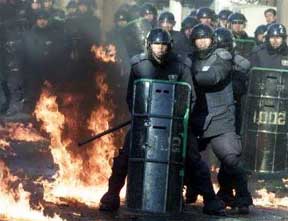
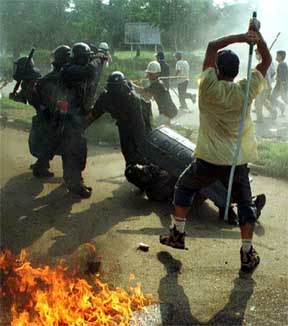

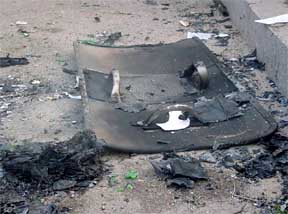
- [044] False Advertising As Law
Enforcement Tool (1/12/2006) Back in Washington Square in New York City, it is noted that there are always marijuana dealers hanging out. Why haven't the police arrested them? The dealers whisper "grass? grass?" or "weed? weed?" to passerbys and they are actually selling 'grass' and 'weeds.'
Except these are not marijuana and you can get as high as one inch off the ground if you jump hard enough.
The police cannot charge them with narcotic sales.
According to Eastweek (print only, no link), that business model has just been deployed in Hong
Kong. Throughout most of last year, the police has been cracking down
vigorously on the pirated adult video stores in the shopping malls of Hong
Kong and Wanchai. But two months ago, the adult video outlets have
returned with a vengeance. The business model began with a test case
of a police raid on November 2. At the time, a young man pulled
out a knife and put it on his own neck, saying "How can you even
confiscate legal disks!?" He had also dozens of his allies at the
scene, and it was quite chaotic. In the end, the man was arrested and
the merchandise taken away. To the surprise of the police, the
VCDs/DVDs were packaged as adult entertainment, but the contents would not
fall into Category III or Category IV. Regardless of the brand new
alluring covers, the contents were usually decades-old movies with the
naughty bits blurred out. For that case then, the man was released
without any charges.
Encouraged by this development, the gang led by someone nicknamed Tall Guy
Kwok with Sun Yee On triad background, went and rented nine store fronts in
the Mongkok district selling the fake adult VCDs/DVDs. These days, the
stores are mobbed every evening by customers. Tall Guy Kwok rents out
his stores to others at HK$3,800 per month and promises to supply them with
VCDs/DVDs. The typical daily take is HK$6,000 per store, so the
renters are taking in more than HK$2,000 per day. Meanwhile, Tall Guy
Kwok is estimated to be making better than HK$1 million a month.
What is the police doing? They know that they cannot arrest the
operators for selling adult material, so they say that they are studying the
possibility of charging the operators with false advertising.
Actually, the easier path is to let them be -- at this rate, the operators
will burn through the customer base, none of whom will ever return. In
a few months' time, the entire industry would be extinct for good.
- [043] Team Tango
(1/11/2006) This Boxun
item is the sort of stuff that makes me choke (laughter/anger). In
Guangzhou's YCWB newspaper, there was a story about the new civil education
campaign to promote being "patriotic, law-abiding, trustworthy and
well-mannered." So far so good, except the headline is "春风化雨 德泽南粤"
(translate: the spring winds turn into rain that showered virtues on southern
Guangdong). This is an obviously play on the name of Zhang Dejiang, the
Guangdong province party secretary. This is the sort of headline that
makes me groan.
Meanwhile, in Hong Kong, we were subjected to a barrage of a WTO-related story
about Team Tango, the squad of all-female police officers. In the South
China Morning Post, here is the coverage in brief:
The women riot police who faced the wrath of Korean protesters during last month's World Trade Organisation mayhem said they had to act like models at a fashion show and make a quick change when trouble broke out.
But instead of the haut couture of the catwalk, they were donning full riot gear.
The 200-strong Tango Company had been put on the frontline without full kit in the hope that the sight of the less-equipped women would help ease tensions between the protesters and the fully geared-up police standing behind them.
But when the demonstrators tried to break through the lines anyway, the women - who had only handcuffs, batons and pepper spray - were forced to retreat.
"We were not running away," said Constable Leung Kam-oi, recalling the events of December 17.
"It was like a fashion show, running back behind the line and getting changed into the full riot gear we had brought along."
...
Constable Leung and fellow frontline officers do not hold a grudge against the Korean farmers who attacked them with anything they could get their hands on and splashed them with a liquid that smelled like kerosene.
Senior Inspector Anita Ko Kit-nam said: "It's impossible to ask us not to go to Korea for a holiday just because of what happened."
I have nothing against Tango and I want to hear even more
Police Stories at WTO. But when I see the same Tango story at Apple
Daily, Ming
Pao, Sing
Pao, Oriental
Daily and The
Sun, then I get a little bit resentful about this transparent
public relations game. As the saying goes, I resent being made to
become paranoid, but what is the motivation for doing so now? It is
as simple as giving some credit to Tango? Or as nefarious as
demonizing the demonstrators (namely, the kerosene dousing)?
- [042] The Photo That Shook Taiwan (1/11/2006) (TVBS)
Found on the Internet was a photo of an unidentified Chinese soldier posing
in front of ... gasp! ... two American F-16 jet fighters. It is believed that
these two 'airplanes' are in fact dummy models that are to be used as
practice targets for training bombing runs by the Chinese air force.
These targets are set up on an island off Guangdong province in an airfield
designed to resemble an actual airbase in Taiwan.
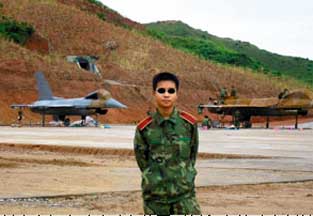

This particular news report ends with stating that the release of such
allegedly personal photographs may be part of a campaign of psychological
warfare by China against Taiwan. Alternately, it could be staged by
the Taiwan government to hype up the threat from China. Who am I to
tell you which is true?
- [041] The
Rule of Law (1/11/2006) Some days, I say the hell with the rule of
law, as this was how this Associated
Press story struck me:
Fifteen Cubans who fled their homeland and landed on an abandoned bridge piling in the Florida Keys were returned to Cuba on Monday after U.S. officials concluded that the structure did not constitute dry land.
Under the government's "wet-foot, dry-foot" policy, Cubans who reach dry land in the United States are usually allowed to remain in this country; those caught at sea are sent back.
The Cubans thought they were safe Wednesday when they reached the Old Seven Mile Bridge. But the bridge, which parallels a newer one, is missing several chunks, and the Cubans reached pilings from a section that does not touch land.
Coast Guard Lt. Cmdr. Chris O'Neil said officials in Washington determined the Cubans should be considered "feet wet" because they were not able to walk to land.
- [040] Means and Medians
(1/11/2006) The follow item appeared in Ta
Kung Pao:
上海財經大學財經研究所都市農業經濟研究中心薛宇峰指出,目前中國農村中,低於平均收入水平的農戶數量在不斷增加,半數以上農戶的家庭收入低於全國平均水平,中國農民收入分配不平等程度日益嚴重。
(in translation) According to Shanghai University of Finance and
Economics' Finance and Economics Research Institutue's Urban-Rural Economics
Research Center's Shi Yufeng, the number of farmers who make less than the
average income is increasing. More than half of the peasants have
family income lower than the national average. Therefore, the unequal
distribution of income for the Chinese farmers are getting more serious
every day.
When it comes to income statistics, there are two numbers that are
usually cited. The mean is the arithmetic average of all the incomes
(that is, you add up the incomes of everybody and you divide that by the
number of people (or households)). The median is the income level for
which half the number of people make less than and the other half make more
than. It is a virtual certainty that the mean is larger than the
median (and this is true even during the Cultural Revolution when almost
everybody made 36 yuan a month but there were still a few that made a little
bit more). For example, in the United States, the mean household
income is about US$75,000 but the median household income is only about
US$44,000. The explanation is the Bill Gates effect -- the presence of
Bill Gates will bring the mean income up significantly, but it will not
affect the median all.
Now let us go back to the statement -- more than half of the peasants
have family income lower than the national average. In other words,
this is a statement that the median family income is lower than the mean
family income. Nobody expects otherwise. This is a vacuous
statement. Why is it in the opening paragraph? The rest of the
article is okay, but this statement is either stupid or else an attempt to
mislead.
(Reuters
AlertNet) Liu Huirong, 29, five years in prison on a charge of
assault;
Wang Liangping, 39, a 15-month jail sentence and Wang Zhongliang, 34, one year on a charge of creating
disturbances; six others villagers were also convicted of creating disturbances but received suspended sentences.
Source: Beijing-based lawyers
Wei Rujiu and Li Heping.
(Washington
Post) Liu Huirong, 29, was sentenced to five years for assaulting a
policeman; Wang Liangping, 40, sentenced to 15 months and Wang Zongliang, 34, sentenced to one year, both for inciting social disorder.
Six others were convicted of causing disturbances and received suspended
sentences. Source: Beijing-based lawyer
Wei Rujiu.
(SCMP) Liu Huirong , 29, up to five years for assaulting police
officers; Wang Liangping , 40, sentenced to 15 months in jail;
Wang Zhongliang and Wang Hongwei were sentenced to 18 and 8 months jail
respectively; Wang Xiaopan , Lu Hongping , Jiang Yonggen and Wang Fagen received suspended jail terms of up to 17 months. Wang Xinwang
( who turned government witness) was acquitted. Source: Beijing-based
lawyer Wei Rujiu and family members.
- [038] Protectionism on Television
(1/10/2006) In Taiwan, the Government Information Office intends to
study restricting the broadcasting of foreign drama series during television
prime time (8pm-10pm) as well as setting up a buying coming to make sure
that the prices do not get bid up through competition.

(front page story in Apple
Daily)
Why do they believe that this is necessary? Because the Japanese and
Korean dramas have proven very popular. This measure will guarantee
that only local made dramas appear during the most lucrative time period,
and it will provide employment and income for the local industry.
Since this may be against WTO rules, this may be done on the basis of
'mututal silent understanding' among the television stations.
According to the Apple
Daily instant poll, "Do you think Korean draams should be
banned during the prime period of 8pm-10pm?" Yes 29%, No, 45%,
Don't know/no opinion 26%.
What about China? Well, they have had gone through the same Korean
storm and soul-searching, as the Korean drama series Jewel In The Palace may
just be the most popular series in Chinese television history. Here is
Lee Han Shih in Asia
Inc:
Movies and television serials from South Korea, featuring an endless
number of surgically-altered actors and actresses, have been gaining
popularity in China, and indeed, in the entire Asia. What triggered the
current outrage, however, was the television series Jewel in the Palace,
the story of how a poor orphan girl in ancient Korea managed to overcome
all manners of difficulties to rise high in the king’s esteem.
The series, with its well-paced plot, pretty actresses and endless
bouts of cooking contest and tear-jerking events, have taken China by
storm. Activities grind to a stop whenever the episodes are shown,
mostly in the evenings. Suddenly all things Korean, from cooking to
costumes to its history, have become objects of interest to the Chinese.
Rates for advertising spots on the show soar. Many Chinese are now
taking tours to South Korea, especially to a theme park named after the
main actress in the show. None of these have gone down well with Chinese
filmmakers.
To rub salt into the wound, a mega-budget Chinese-made serial on the
great Han emperor Wu, has been largely ignored by audience who preferred
to follow the trials and tribulations of their favourite Korean
actress. This led some filmmakers to openly and bitterly
complain about the “lack of taste” of the Chinese audience. “The
Emperor Wu serial is every bit as interesting and well-acted as the
Jewel in the Palace. Why is the audience so blind?” they
asked.
An impartial observer could have told them the first, last and
ultimate test of a television serial lies in audience acceptance. It
does not matter how much effort and money have gone into making a show,
it is junk if it is rejected by the people. The Emperor Han serial may
be magnificent — and it is, by many measures — but it is just
bad luck that it has come across something that appeals more to the
audience. This is what open competition is all about.
The complaints and the subsequent request for protection illustrate a
shady, sorry side of the Chinese market. On one hand China is now the
bogeyman who is eating everybody’s lunch. Yet, hiding in the shadows
are many industries that are not equipped to cope with the pressure of
doing business internationally. With China committed to open its market
under its agreement with the World Trade Organisation, the days of many
of these industries are numbered.
...
The Chinese film industry, which has just celebrated its 100th
anniversary, is moribund. For this, much of the blame must go to
the filmmaking companies themselves. Just take a look at the
object of contention, Jewel in the Palace. If it was made in China, it
could breeze through the censors, nothing said in the show is
controversial. No politics, no sex (not even a glimpse of the legs, as
everyone is enclosed in those voluminous Korean hanbok), hardly any
action. It is just people talking, cooking, laughing and crying. Yet it
holds the entire Asia spellbound. Lured by the show, a record number of
Japanese have visited Korea. In Hong Kong, conversations in the public
transports are full of what happened the night before and what would
happen next. Jewel in the Palace has made South Korea the Asian country
after Japan to become an international film power.
So why couldn’t China, which has many times the population of South
Korea, and a history reaching back 4,000 years, do it? The answer is
that the producers, instead of making what the audience wants to see,
make what they think the audience would like to see. They make
films under the same old, tired formula and expect to get good
reception. When that fails, they complain and cry for protection.
They are, in effect, spoiled brats who must have things their way.
Unless this attitude is changed, the Chinese film industry will
never move beyond where it is today.
Last month, Democrat lawmaker Andrew Cheng invited [Hong Kong University virologist Guan Yi] to Legco to clarify his allegation that ran on December 9 in Toronto's The Globe and Mail.
The paper quoted him as saying: "Quite honestly, some provinces have the virus and they still haven't announced any outbreak. I can't show direct evidence because China is trying very hard to block my research. The government doesn't do any surveillance studies, but they say there is no outbreak."
Guan has denied he made an allegation that China is covering up avian flu outbreaks.
In a written reply submitted to the Legislative Council health panel Monday, Guan insisted: "I have not said in my previous interview that the Chinese government is hiding, masking or manipulating the information on bird flu."
Here is even more mystery: According to The Globe and Mail (see Workopolis
and Future Health
Solutions), the quote was:
“Quite honestly, some provinces have the virus and they still haven’t announced any outbreak. I can show direct evidence, even though China is still trying very hard to block my research. The government doesn’t do any surveillance studies, but they say there is no outbreak.”
There is a vast difference between the sentence "I can show direct
evidence" in the original Globe and Mail article versus the sentence
"I can't show direct evidence" quoted in The Standard.
What is going on?
- [036] Ten Big 'Jokes' From 2005
(1/10/2006) From John at Sinosplice,
here is a list of statements in the public record at People's
Net. The original post contains the names and titles of the
emininent public figures who said the words, but I am going to spare them
the ignominy in the translation below. Please note that these are not
'jokes' in the sense of being funny or humorous; these are 'jokes' in the
sense that your reaction is something like: "You must be joking because
I can't believe anyone can possibly say this." Also, in some of
the quotes, I have added the context of the event (e.g. the explosion in #10
is identified as the Jilin PetroChem explosion that contaminated the Songhua
River).
1. "The petroleum, telecommunicatinos and electricity industries are
not monopolies. They belong to the country and the people, and the
profits go to the people."
2. "Educational reform in China has succeeded! As an educational
system that has the heaviest burden in the world, we have realized two
'breakthroughs': 85% of the people receive free education and 20% receive
higher education."
3. "Pharmaceutical drugs cannot be sold like steamed buns! The
price of drugs is not expensive. We do not agree to reduce the
prices."
4. "Real estate is about sudden huge profits! Let us keep sudden
huge profits going!"
5. "Mining disasters such as the one in Jitaihe (Heilongjiang) have to
do with the poor quality of the mine workers!"
6. "When 'police-criminal' collusion is present as in Chengdu, an
important cause is that police pay is too low."
7. "If the minimal wage threshold for taxation is set too high, it will
deprive the low wage-earners of the honor of becoming taxpayers."
8. "The eight hundred million farmers and dismissed workers are a great
source of wealth for China. Without their existence, a small number of
people will not be enjoying so much. It is essential that they exist
and maintain the current situation."
9. "The new anti-terrorism method -- let the families of Guangzhou
subway workers travel free in the system so that they can help evacuate and
rescue in an emergency. This is a safety procedure as opposed to
handing out free passage as welfare."
10. "The Jilin Petrochem explosion created only water and carbon
dioxide. It will not contaminate the water supply."
- [035] Reporting Sudden Public
Incidents (1/9/2006) (Beijing
News) This item (《国家突发公共事件总体应急预案》)
is the new plan about how to handle sudden mass incidents in China. Such
incidents include natural disasters (such as floods, famines, weather,
earthquakes, fires, etc); manmade disaster (such as safety problems in
industry, mining and commerce, transportation, public facilities and
infrastructure, environmental pollution, etc); public health (such as
epidemics, food safety, occupational safety, etc) and social safety (such as
terrorist attacks, economic well-being, foreign incidents, etc). For the
public, here is the most important part of the action plan: After the incident
occurred, the information must be given to the public immediately. If
the public is not informed, the responsible official is criminally
liable. I am sure that this item will come in handy when the next
incident occurs. I'll believe it when someone actually goes to jail for
failure to inform the public.
- [034] When I Grow Up, I Want To Be
... (1/9/2006) At the support rallies for the Korean farmers,
there is a 7-year-old Hong Kong boy named Lee Sin-hang who comes with his family
of five.

Here is the photograph that has been zipping around the Hong Kong
blogosphere (see Sidekick).
The text is translated as follows: "I wanted to become a dog-handler
(police) because I like little dogs and I want to become a police man.
During the WTO period, the police had no self-confidence. The police
used pepper spray, water cannon and tear gas. They used it to spray
the demonstrators. The demonstrators got a bit mad, they charged
harder. The demonstrators charged the defensive line. Those with
Hong Kong ID can leave, but those without had to go to the police
station. I feel that this is unfair. I think that the police was
wrong. So I don't want to be a dog-handler. Lee Sin-hang, 7
years old."
The boy's mom had sent this letter to the various newspapers in Hong
Kong. Which ones will publish this? Probably none. There will no doubt be a debate about
whether this 7-year-old has been brainwashed by his parents, as if parents
don't tell 7-year-olds what to do. You can tell 7-year-olds to wash
their hands or do their homework, but you can't talk to them about how the police treated those
with and without Hong Kong ID's differentially because you are brainwashing
them about how the rule of law does not actually exist.
- [033] The Korean Farmers Saga (To Be
Continued) (1/9/2006) (Apple
Daily) Of the fourteen people charged during the WTO demonstrations,
11 are South Koreans. They are presently prohibited from leaving Hong
Kong while awaiting the completion of the police investigations. Why
is it taking so long? There were issues with the police line-up at
first, because of the difficulty in finding actors who are conceivably pass
as Koreans. Reportedly, a new police line-up had been made with one
demonstrator being identified for posing as a photographer (huh?).
After the next hearing, if the South Koreans are not released, then it has
been announced that the South Korean farmers union will organize 300+ (some
accounts give 1,000+ but that was an error by the simultaneous interpreter)
farmers to come here to demonstrate against the Hong Kong law enforcement
agencies.
Here is the conundrum as defined in the Sing
Tao editorial of 1/9/2006. On one hand, there is the opinion
that if these people are simply released and sent away, peace and quiet will
return to Hong Kong. On the other hand, this is now a very public
case. If the demonstrators are simply released, there will be a price
to pay in the rule of law. Someday, Hong Kong demonstrators may clash
with the police in the same way and they will demand equal justice (or lack
thereof). Other foreign demonstrators will come here and expect the
law to be a 'paper tiger' for them.
The Sing Tao editorial recommends that the legal process takes its course
according to the law; it also asks organizations which assisted the Korean
farmers during the WTO MC6 period to explain to them about Hong Kong law and
the fair trials that the defendants will receive. On this last point,
even this blogger must ask just which planet that came from.
There is another element here important in Chinese culture -- face.
Dick Lee and his Hong Kong police arrested 900+ people and charged 14 of
them. Can they afford to just let them go for lack of evidence?
It is as if they are forced to put them on trial, however weak the evidence
is. So those 300+ South Korean farmers should book their airplane
tickets (circa January 22).
- [032] Frost Watching (1/8/2006)
The concept of frost watching is probably alien to 99.99% of the world
population, unless you live in the same latitude as Hong Kong. Here it
is cold enough to be uncomfortable but not enough to ever see snow.
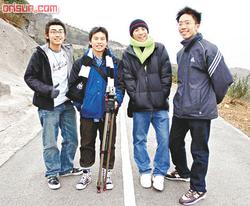
(Oriental Daily)
Yesterday was the coldest day this winter when the temperature dipped to a
low of 8 degress centigrade at the Hong Kong weather observatory. Four
university students went out early in the morning to go up to the peak of
Tai Mo Shan, the highest point in the Hong Kong SAR. The recorded
temperature in the open space was -1.3 degrees of centrigrade. They
waited and waited but saw no sign of frost. Although they were
disappointed, they consoled each other: "Actually, it was a lovely
sunrise. We are content and this was not a wasted trip."
As for me, I have been through snow storms in which the the snow drift was
about 4 feet over my head. It is not very romantic to have the ice
particles coming at your face horizontally at 50 mph. It is even worse
when the snow melts, because it is all wet, icy, slippery and filthy. So I
regard this Hong Kong tradition of frost-watching at the peak of Tai Mo Shan
with morbid fascination. They want what they can't have; but if they
ever get it, they would wish that they didn't. Note: If you think that
there is a political message here, you are over-interpreting ... you need to
take a break. Really.
- [031] The Hou Guixin Interview
(1/8/2006) In the unlinkable South China Morning Post, there is an
interview with Chinese blogger Hou Guixin by Josie Liu.
How would you define a weblogger?
Someone who has something to write, writes regularly and has a personality. The first wave of weblogs surfaced in China in late 2003 when a large group of media people had something to say. They used to write for their own newspapers and magazines and then, one after another, started their own weblogs.
Do you think you have more freedom of speech with blogging?
There is less freedom in terms of subjects. I, as well as other bloggers, know which subjects cannot be touched. Some bloggers have had their sites closed down. They also lost all they had written because they didn't save their work. I don't want that to happen to me. But I can write about what I'm interested in, and there is no limitation on length or style. With traditional media, writing is largely for the consideration of readers, and the results fell short of me expressing my true feelings.
How do you think weblogs will influence Chinese society?
There are many things that can't be published in newspapers or magazines but can be posted on weblogs, and this helps people to learn more about what is happening and guide them to form their own opinions. The pool of bloggers will become vast in China because Chinese people generally lack means for expression. When the group reaches tens of millions, they possibly will become a force to advance the system.
- [030] Chinese-style Boycott (1/8/2006)
Here are some alternate voices with respect to MSN Space:
[Oiwan Lam at InMediaHK]
(in translation) At Isaac Mao's blog,
he wrote that bloggers must force MSN to get out of China. But
what are their options afterwards? Go back to blogcn in China,
donews or that even more damnable bokee? Anti and Mao chose
foreign blog hosting services that are blocked in China. But are
others supposed to go back into the danger zone in which their
indigenous companies help the government to censor the Internet?
While MSN is contemptible, those nationalistic websites who are hoping
that MSN would shut down Anti so that they can profit from its demise
are even more disgusting.
A truly open and free path is that we must condemn MSN while at the
same time we must also condemn those companies that want to play on
nationalism, destroy freeom of speech and rely on government power to
profit. Otherwise, we are doing exactly what they want.
[Chiu
Yung's Blog] (in translation) Faced with the same
circumstances, which BSP (Blog Service Provider) in China can say that
they can do better than MSN? Blogbus, Blogcn, Blogdriver, Donews,
Sina or Netease? (and never mind that shameless Blogchina). I dare
say, if the people on top want to delete a certain blog, then the BSPs
in China will oblige without further thought, and they will even
voluntarily take preventative measures against "sensitive"
content.
I ask which Chinese BSP has the courage to say: "Come, Anti, and
set up home here. We will protect your forever."
None. Absolutely none. Therefore, when the Chinese
(especially those BSPs) ask the people to boycott MSN Spaces, aren't
they somewhat less than righteous?
To die on MSN Spaces will at least get some international
impact. It is a glorious death for a good cause. To die at
the hands of a Chinese BSP is as light as a feather. No one will
mourn for you, because you are just one of the many mistakes.
A very unfortunate fact is right in front of us: as far as content
and freedom are concerned, MSN Spaces is far better than all you
BSPs. An even more unfortunate fact in front of us is that we are
not even qualified to boycott MSN at this moment.
- [029] Anti On MSN Spaces (1/7/2006)
Is the Anti blog gone from MSN Spaces? Superficially, it would seem
so. You cannot access the original MSN Spaces blog anymore and he is
known to have to have set up again at blog-city.
The first blog post over there is titled
长城脚下,我们2006年继续出发
(At the foot of the Great Wall, we will continue to set out in 2006).
Just as a matter of curiosity, I plugged that title into Technorati and I
found these blog posts with the full post reproduced.
-猪窝
-leleye
-王宁博客
-咖啡时光纪
-安猪的日记
-茅房里的思考
-本当 临时欧洲
-洋芋和奶奶个熊
-龙只因海的荆蛮客
-童年与成年的距离
-如人饮水,冷暖自知
-流浪,草原,白云朵朵
-narkau~♡~催眠性
-宁可选无题,不可写无趣
-往者不可谏,来者犹可追
-Bill's Fortress of Solitude
What is in common about these blogs? They are all on MSN
Spaces. (Note: This Anti blog is just as prevalent on other Blog
Service Providers in China, but Technorati does not cover the other
Chinese BSPs well (see Ethan
Zuckerman). So we are back to the Zen question: Is the Anti
blog still at MSN Spaces?
Is it a problem for me to identify these blog posts? Anyone who can
use Technorati can find them. Even if these blog posts get deleted,
and even if these blogs are deleted totally, all it means is that they
will re-surface elsewhere and all their sympathizers will do the same.
- [028] Apple Daily Front Page Headline
News (1/7/2006) There is a legend about how Apple Daily
chooses its front page story in Taiwan. Rule #1: No politicians (e.g.
the President, the Premier, etc ). This is based upon an empirical
tracking study of newsstand purchases -- when the President shows up, sales
plummet. But there is also Rule #1a: A politician can be featured on
the front page in the event of a political scandal. Again, according
to the tracking study, sales soar. But most of the time, the front
page features social stories.
On this day, here is the Apple Daily front page. The headline is
"Teacher grabbed breasts of pretty doctoral student."



In truth, the story
is skimpy. The teacher here is a guest lecturer from mainland China
teaching classical Chinese literature in Tsinghua University in
Taiwan. The student is a Lin Chiling look-alike. In late
November, the teacher grabbed the student from behind and touched her
breasts. After a struggle, the student broke away and ran.
Several days later, the student complained to the Gender Equality Commission
at the university. The teacher was interviewed and admitted having
done so. He wrote a letter of apology. The newspaper was not
able to interview either principal. When the reporter approached the
teacher (named Wang), the man said, "No, my name is Li!" and then
took off like a 100 meter sprinter. There were obviously no
photographs, so illustrations were used to enhance the imagination.
So will this generate more or fewer sales?
- [027] The Sing Tao Apology (1/7/2006)
With respect to The Sling Shot
at the Hong Kong WTO, the following item appeared in a small box on the
editorial page (A18) on Thursday, January 5, 2006. I thank a
journalist in another newspaper of the Sing Tao group for pointing that out
to me.
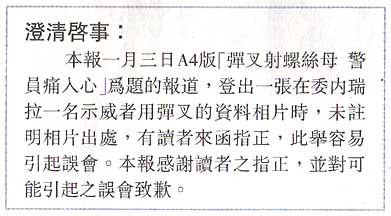
(In translation) Notice of Clarification: On January 3, our newspaper had a
report on page A4 titled "Sling used to fire screw bolts, Police hurt
painfully" with which there was a file photo of a Venezuelan
demonstrators using a sling. The source of that photo was not
noted. A reader has written a letter to point out that this can easily
cause misunderstanding. Our newpaper thanks the reader for pointing
that out, and we apologize for having caused any misunderstanding.
While this is the typical amount of space and attention given to corrections
in mainstream media, this is woefully inadequate because this is not a
simple case of a missing caption. This was an intentional act.
The only thing that this notice of clarification is good for is that when
the Hong Kong Press Council calls, the newspaper can say that a notice of
clarification had been published.
- [026] What Is Democracy? (1/7/2006)
I must say that it is reading frustrating reading certain pro-democracy
Chinese writers. I will use this example from Fang Jue (方觉)
published at Boxun
about 'the Latin American political counter-current.' The overall trend
in Latin American countries in recent years as well as the foreseeable future
is that more and more leftists will become the leaders. Apart from the
ancient Fidel Castro of Cuba, here is a list of 'leftists': Chavez in
Venezuela, Lula in Brazil, Kirchner in Argentina, Morales in Bolivia, Vazquez
in Uruguay and soon to come will probably be Michelle Bachelet in Chile and
Lopez in Mexico. These countries account for at least 80% of the
population in Latin America. Here is what Fang Jue wrote:
It seems that the political map in Latin America is undergoing a
certain change. But this change is in exactly the opposite
direction of the world trend towards free democracy ...
The United States is still and will continue to be in the leader
position in the Americas. The political counter-current in Latin
America has raised concerns among the American government, American
politicians and American intellectuals. The United States will
continue to promote the democratization and liberalization in the Latin
American region. Those countries in which the left-wing
counter-current political authorities are located still contain open and
competitive democratic oppositionists who have international
support. The left-wing counter-current political authorities offer
a counter-example as a lesson: it is necessary to rear true and powerful
modern democratic political parties in Latin America, it is necessary to
have truely free social systems and it is necessary to inject various
global mainstream cultural trends into Latin America in order to prevent
various kinds of socialisms, nationalisms and populisms to use elections
to domininate the political stages of these countries.
What are we missing here? Apart from Castro, all the other
leftists -- Chavez, Lula, Kirchner, Morales, Vazquez, Bachelet and Lopez
were (or will be) democratically elected in fair and open elections.
So why are they said to be counter-current? Well, here is real deal
-- unless you agree to adopt 'global mainstream cultural trends' (read
IMF/WTO/USA/EU dictates), you are not a 'free democracy' even if you elect
your own president and government in open and transparent elections with
universal suffrage.
And if this is a counter-current, you should look back at the original current that
existed in the 1980's and 1990's -- they elected governments which
followed the IMF/WTO/USA/EU prescriptions but life did not improve for the
majority of the population. So that is why there is a democratic
'counter-current.' If you want a democratic counter-counter-current,
then you better believe that advocating 'global mainstream cultural
trends' is NOT the right message -- the electorate had been there, they did
that, they didn't like it so why would they choose it again? The
reason why the leftists are winning elections everywhere is that the
countries are watching each other and they are seeing that the 'leftist'
model is better than the IMF/WTO model which brought so much grief to so
many.
If you a true believer in freedom and democracy, this is the problem that
you should be thinking about, not about spending more money to create
oppositional parties. Giving them the right issues has greater
impact than more cash (and you should not let the people who were getting
the cash previously tell you otherwise).
- [025] The Sling Shot Appears At
Economic Journal (1/6/2006) My photoplay The Sling Shot
at the Hong Kong WTO made it into the Hong Kong Economic Journal
(see InMediaHK at the bottom of the page near January 6, 2006. The
relevant paragraph is this:
在二○○六年一月三日《星島日報》A4版,有一幅很大的照片,旁邊的文字是「反世貿示威者以殺傷力極大的彈叉發射鐵絲母攻擊警察」,報道的內文及一同出現於該版的其餘照片,皆攝於世貿間的示威。該版的大標題,「彈叉射螺絲母,警員痛入心」。事實是,就是警方所檢控的十四件案中,並無提及任何彈叉射螺絲母事件。而《星島日報》這張暴徒用彈叉射螺絲母照片,來自二○○四年二月於委內瑞拉首府舉行G15高峰會議示威,《星島日報》完全是張冠李戴。《星島日報》的編輯,大概不認識互聯網的威力,亦不知民間的監察者神通廣大的一面。網站「獨立媒體」已經將事件報道,網上正在廣泛流傳討論,進一步只是有何抗議行動。民間媒體負上監察主流媒體的責任,不容弄虛作假的敗類作惡,這是漂亮的一仗!
[in translation] On January 3, 2006, there was a large photograph
on page A4 in Sing Tao and the words on the side were: "Anti-WTO
protestors used powerful sligns to shoot iron bolts to attack the
police." The accompanying report as well as all other photos
referred to the WTO demosntrations. The big headline on the page was
"Slings shot iron bolts, police hurt painfully." The truth
was that of the 14 prosecutions that the police made, none referred to using
slings to shoot iron bolts. The photograph used by Sing Tao of the
rioter shooting iron bolts with a sling came from the 2004 February G15
summit meeting protests in Caracas, Venezuela. Sing Tao had
misappropriated the photograph. Sing Tao's editor probably does not
realize the power of the Internet as well as the omnipresence of the
civilian monitors. The website InMediaHK has reported this affair, and
this is a topic that is broadly discussed on the Internet. The only
question is just which type of protest action will take place. This
was a brilliant battle in which the civilian media assumed to responsiblity
to supervise and monitor mainstream media and refuse to let those renegades
commit fakeries.
- [024] Blame It On The Internet
(1/6/2006) (TVBS via Yahoo!
News) In Taiwan, independent legislator Li Ao picked up a copy
of a report from the Defense Ministry and ripped in up, literally and
figuratively, on television.
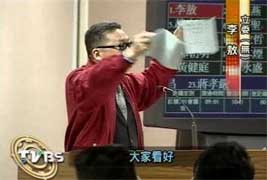
Li Ao: "Everybody look. Why did I rip it up? I tell
you. Let me tell you. How can you make numbers up? Let me
divide for you. Is the South Korean defense budget 4.38? The
answer after division is 1.987. Even the basic number is in
error. Why take it to try to fool us legislators? This is
nonsense." "Can the legislator let me explain?"
"You made it up. What is there to explain? Okay, you
explain." "We downloaded this number from the
Internet."
- [023] Nujiang Ruver
(1/6/2006) On one hand, I ask you to read Jim Yardley at the New York
Times via The
Ledger (Lakeland, FL). On the other hand, I am going to
publish (without permission) a private email (and I hope that she doesn't
mind):
I went to Nujiang and deep into the canyon, I stayed with a farmer family there. When
I had my breakfast or dinner, at least 3 dogs and one little pig waited
on us to feed them under the table. It was so funny to eat with them ( but
I was also surprised to see my friends eating pork when there was a lovely pig around). And I was amazed to watch the puppies playing with the little piggies. It was a wonderful experience.
The scenery along Nujiang is beautiful. However, the lives of the peasants are terribly bad. I went to some poorest villages, the peasants live in very raw wood houses. Even though the timber there is cheap, they can only afford to build a tiny house usually around 10sq m. I visited a family and saw them making To Fu Fa to celebrate new
year. A wok, an old wooden bed and some glass bottles are the total assets of the family of three.
Despite life is difficult, they don't find themselves very poor, they love their village, they love
NuJiang and they love their land. However, the proposed water dams will definitely further worsen their livelihoods in the future. This is very unfortunate.
I have been thinking a lot for the past week, especially about the problem of over-consumption. Electricity won't cost us much who live in a developed city, but the social cost is very huge. We have to sacrifice the beautiful scenery of Nujiang for 13 water dams and hydro-electricity plants, we have to take away the lands from the farmers.
(Now, I have to switch off some lights first). But do we really need so much electricity?
- [022] Some Beijing News Factoids
(1/5/2006) From the latest Yazhou Zhoukan issue (via ChineseNewsNet):
First, there is no mass departure of staff at this time nor is there
expected to be -- that is, until after the Spring Festival! The
workers will collect their year-end bonuses and then the exodus will
begin. The only question left is the number of departees, and that
will be a function of how the overlords behave over the next few weeks (and
the report is that they are bad!).
Second, according to a Bejing News editor, the Beijing City Government News
Office issued this notice on December 30, 2005: "1. Effectively
immediately, all websites shall treat the words 'Bejing News' as a keyword
to filter at all forums, news comments and blogs. 2. Increase control
of opinions about the 12/6 Shanwei Honghaiwan incident and implement the
spirit of the notice from Government News Office, enhance management of
forums, blogs and personal websites and delete all harmful related
information resolutely in a timely manner."
Third, two articles appeared elsewhere at around the same time. They
do not refer to the Beijing News situation per se, but this is China and
everybody knows how to read meaning into the seemingly unrelated
coincidences that are too much of a coincidence. The first article
(see 邵飘萍“铁肩辣手”办《京报》 被反对军阀杀害)
appeared in Legal Mirror on December 29, 2005 and recounted the story of how
the famous newspaper publisher Shao Piaoping began the original Beijing News
and was assassinated by a warlord. The second article appeared at the Netease History
Channel (see 《光明日报》十批马寅初 多生几亿人该谁负责?)
and recounted how the Guangming Daily once made a political attack on
population demographer Ma Yinchu in the 1960's. It quoted Ma as famously
saying "Guangming Daily is neither bright nor open." (Note:
Guangming literally means 'bright and open.') Later on, Ma retracted the
statement after a piece of soul-searching apology appeared in Guangming Daily
on August 5, 1979. Legal Mirror belongs to to the Beijing Youth Daily
group and the first article has been
'disappeared.' Netease is a commercial enterprise, and whoever did that
is obviously trying to look innocent (and very pretty to the masses, too)
because nobody said anything about the 1960's/1970's being out of bounds for
discussion.
- [021] The Penetration of Mobile
Phones (1/5/2006) Somebody ought to
translate this New
York Times piece (found thru my orange-colored website) into Chinese
and have a lot of fun with it. Or shall I guess that it has been done
many times already before.
I had barely sat down when I heard a voice from the other bathroom stall saying, "How are you?" I don't know what got into me, but I answered, somewhat embarrassed, "Doin' just fine." And the other person said, "So what are you up to?" (What kind of a question is that?)
At that point, I was thinking, "This is too bizarre," so I said, "Uh, I'm like you - just traveling." At this point I was just trying to get out as fast as I could when I heard another question. "Can I come over?" O.K., this question was just too weird for me, but I figured I could just be polite and end the conversation. I answered: "No. I'm a little busy right now."
Then I heard the person say, nervously: "Listen, I'll have to call you back. There's an idiot in the next stall who keeps answering all my questions."
- [020] MSN Spaces Explains Anti
(1/5/2006)
Followup to Chinese thing, off to CES
Scobleizer
I have been talking to lots of people today, though, inside and outside of Microsoft. In every instance they asked me to keep those conversations confidential. Why? Cause we’re talking about international relations here and the lives of employees. I wish I could go into it more than that, but I can’t. Not yet. See, it’s real easy as Americans to rattle the door and ask for change, but we don’t live there. Saying “give them the finger” isn’t that easy when there are real human lives at stake. And I don’t need to spell out what I’m talking about here, do I?
One thing I’ve heard is that we spell out our terms of service very explicitly on MSN Spaces. Here in the United States we pull down stuff too at government request, like child pornography or other illegal content.
The MSN Spaces blogger at The
Line One (第一排)
had the following correspondence exchange with MSN Spaces:
(in translation)
I have previously reported two instances
of abuse on MSN Spaces sites and they were appropriately dealt
with. I thank you. But today I want to complain about a blog
that I read every day and which had no abusive conduct. More than 600
people subscribe to it on bloglines and the author is the renowned media person
Anti, who was a judge in this year's world blog competition. Why did
you shut down his blog? Please give a reason to an ordinary user who
has always supported Microsoft and your work. Is there no freedom of
speech in China? I await your response, thanks.
Dear Respected User, how are you? We
thank you for your letter to the MSN Spaces Technical Support Center
concerning abuse. We are sorry, but this Space touched upon
political factors and we had to close it down. We are deeply sorry to
have caused you any inconvenience. Regards, Cai Lingyan (蔡凌燕),
MSN Spaces Technical Support Center.
Touched upon politics? Which rule
of conduct of MSN Spaces did that break? I went through the Code of
Conduct and
I could not find it. Thanks.
Dear Respected User, how are you? We
thank you for your letter to the MSN Spaces Technical Support Center
concerning abuse. Concerning your question, we need more time
to make additional assessment and study. Although we are unable to
give you an exact time about when the problem will be solved, we ask you to
trust that we are trying our best to solve that problem. We are sorry
that we cannot provide an immediate answer, but we will try our best to
solve that problem for you as quickly as possible. Regards, Cai Lingyan (蔡凌燕),
MSN Spaces Technical Support Center.
Related link: Running a Service in China
Michael Connolly, a product unit manager on MSN Spaces
In China, there is a unique issue for our entire industry: there are certain aspects of speech in China that are regulated by the government. We’ve made a choice to run a service in China, and to do that, we need to adhere to local regulations and laws. This is not unique to MSN Spaces; this is something that every company has to do if they operate in China.
So, if a Chinese blog on MSN Spaces is reported to us by the community, or the Chinese government, as offensive, we have to ask ourselves: is this blog adhering to our code of Conduct? In many cases, the answer is “yes, this site is fine”. But, in some cases, the answer is “no”. And when an offense is found that actually breaks a national law, we have no choice but to take down the site.
[emphasis added; there are two components in this response -- in the
first instance, Who reported Anti? Was it a member of the
community such as the commentator at Bokee (see Good
And Bad Things Happened To Mr. Anti) or the Chinese government? In
the second instance, it was Microsoft's determination that Anti broke a
national law.]
Related link: Microsoft censors Chinese blogger.
Andrew Donoghue, ZDNet UK.
- [019] 3G Applications
(1/4/2006)
Why would you want a 3G mobile phone? What can you do with it? (Apple
Daily, Oriental
Daily) On May 2, 2004, a 31-year-old female 3G user named Han
received a call. At first, the video image was unstable, and she saw a
male reproductive organ on which masturbation was being performed. She
hung up the phone and called the police.
On June 20, 2004, a 17-year-old female 3G user named Tsui was giving private
tutor lessons when her phone rang. The screen showed a male
reproductive organ. She hung up the phone immediately. Seven
minutes later, another call came and there were scenes of
masturbation. She was disgusted and called the police.
From the 3G service provider, the police found out that those two calls came
from the same number. In the month of mid-June to early July last
year, there were more than one thousand random calls made from that
number. The police contacted some of those numbers and found a
17-year-old female named Ku. On the morning of June 22, 2004, Ku was
sleeping when a telephone call woke her up. A voice said, "It's
me!" and then the picture showed a male reproductive organ. Ku
was scared and hung up immediately. Twenty minutes later, another call
came and the picture showed masturbatory action. She hung up but did
not call the police at the time.
Yesterday, at the Kwun Tong (Hong Kong) court, a 23-year-old male named
Leung pleaded guilty to three counts of making harassing (obscene) telephone
calls. For prospective copycats, this is a bad idea because the 3G
service provider knows who called whom. Once again, this has been a
English-language public service announcement from your favorite website,
which brings all the news that South China Morning Post and The Standard
deemed unfit to print.
- [018] What Did Anti Think When He
Found Out (1/4/2006) So what did Chinese Michael Anti think
when he realized that MSN Spaces had shut down his blog? Here is the
translation of the section of his post at his blog-city
site (mirrored at ZonaLatina.com):
On the afternoon when Microsoft deleted my space, I did not feel
anything at all. A few days ago, I was at Peking University
speaking to students and someone asked me whether MSN Spaces would be
shut down on account of me. My response was, "When the
warning comes, Microsoft will sell me out first. So everybody
should feel free to use MSN Spaces." I sensed that the day
will be coming. Over the last days, the daily traffic was about
15,000, and then everything was deleted. Damn Great Wall, damn
Microsoft. I will make Microsoft pay.
That night, I felt bad and I cried.
It is so hard to be a free Chinese person. This year, my blog
was shut down twice because I supported media (Chinese Youth Daily and
Beijing News). When I was in Hong Kong, I told the reporters that
I know where the bottom line is. The problem is that when my
fellow media are in trouble, it is my obligation as a member of the news
media to offer support immediately. Under this type of moral
obligation, personal bottom lines are irrelevant. One can continue
to live meticulously and technically, but one must also have another
side that puts everything aside to express true feelings.
- [017] Chinese Blogger Anti
(1/4/2006) In December
2005 Comment #100, I noted that the MSN Spaces blog for Chinese
blogger Michael Anti (aka Zhao Jing) was gone, as was his English
blog. What can I do? I am nobody. But a couple of
heavyweights have stepped in on his behalf. First up was Rebecca
MacKinnon, Next, we have Scobleizer
of Microsoft:
Why is this so important to me? Well, you ignore the voices of individual people at your peril. And, I’ve been raised by people who taught me the value of standing up for the little guy. My mom grew up in Germany. Her mom stood up to the Nazis (and got a lot of scorn from family and friends for doing so).
I do believe in a slippery slope. If they come after you today, maybe they’ll come after me tomorrow. Gotta stop this kind of stuff while we’re still talking about you.
Oh, and to: Zhao Jing, aka Michael Anti I’d like to offer you a guest blog here on my blog. I won’t censor you and you can write whatever you’d like.
If and when Michael Anti begins a guest blog
at Scobleizer, I promise that I will mirror everything and ask all my readers
to do so as well such that it becomes impossible to banish, block, censor,
ban, whatever.
P.S. Anti is reviving his Blog-city
site. This foreign site is not accessible inside China. I
am offering an alternate version without the full functionality at ZonaLatina.com,
and you have information to subscribe through feedburner and gmail. I
use my Latin American site because it is unlikely to come to the attention of
the Chinese Internet censors.
- [016] Sidekick Replies
(1/4/2006)
In the post My
Favorite Hong Kong Blogs, I named Sidekick as the Big Sister of the
Hong Kong blogosphere. In 天外有天!天外有獎!,
Big Sister expresses her gratitude. Now, my platitudinous statement was
somewhat bizarre: "ESWN’s comment: the unchallenged big sister of the Hong Kong blogosphere; full disclosure: I have no business connection, no contact and no knowledge with/of the person."
That was because at the time, Sidekick was getting hammered for making certain
statements out of alleged conflict of interest involving other organizations
and persons (but how can she be serving someone whom she has never ever met in
her entire life!?). Ergo, my statement was made in sarcasm against her
attacker and she must surely understand. Sidekick wrote: 小踢才疏,竟得宋先生厚愛,汗顏之餘,只能感激!在此祝願宋先生身體健康,生活愉快,繼續傳達訊息!
Alas, I ought to be the person grateful for the attention of Big Sister.
It is that attention that validates my existence as a (minority) Hong Kong blogger.
- [015] Sidekick Tries Podcast
(1/4/2006)
As I wrote before, I have never corresponded or spoken to the Hong Kong
blogger known as Sidekick before (see above comment). Big Sister
Sidekick has just released her first podcast at SideCast 060103
(in Cantonese). I listened to it and I am touched. Maybe you
don't understand Cantonese, but I ask you to listen to the melodious voice
-- surely, you will like the person behind that voice. I listened to
it, and it is as if I have known her all my life. As for me, I doubt
if I will ever do a podcast because I speak terribly. For those of you
who missed my BBC International Radio interview, I have the wma file here.
This is a 9.3 megabyte file that runs for about 25 minutes, so you are
better off downloading it with the right mouse click on Windows and then
listening to it. Heaven forbid, but somehow I have a snotty
British/Australian accent (because I was speaking with BBC's Carrie Gracie),
and therefore completely off the New York City accent that my friends
usually know me by! I made far too many hems and haws, and I am going
to have to take a lot of training before I become a decent radio/television/podcast speaker!
- [014] The Dongying Protest (1/4/2006)
The Dongying Protest
post was submitted to EastSouthWestNorth and published without
verification. The fact is that this blog is run by a single individual
without any means of verifying anything in a place such as Dongying.
Therefore, I am forced to make a personal and subjective judgment as to
whether it is appropriate. There are plenty of precedents: The
Water Crisis in Harbin was made much more personal and compelling
by the local reports from Harbin residents sent directly to me.
On one hand, I have no intention of becoming like the Boxun (Peacehall)
website. I will not have a policy of publishing any and every
submission and let the people figure out what the truth is. I have
said many times that this is irresponsible and deleterious to the
credibility of independent media (see, for example, Signal-To-Noise Ratio In Internet News).
Thus, I am forced to make a personal and subjective assessment about the
credibility of any submission. For example, there is a recent story
about by a certain "cult-related" website about how a Russian
surveillance satellite recorded Shanwei residents being hunted down and
executed in cold blood. With due respect, the shooting occurred
between 8pm and 10pm in total darkness; infrared satellite films of a mass
incident cannot show what was happening on the ground; even if they did, the
Russian government would not have shown them to a certain 'cult-related'
Internet publication.
On the other hand, I have to balance the value of such a report. The
Dongying Protest post was interesting to me, because it is an example of the
ineffectiveness and harm due to information control. The Dongying
citizens walk around the streets and they can see with their own eyes that something is
askew. But there is no public information. That leaves them to
depend not on Reuters, but on the Roadside News Agency. I ask you to
read that post and ponder what you would think as a Dongying resident.
- [013] Young Girls Bathe in Public
(1/4/2006) In yesterday's post, Young Girl Bathes in
Public, at least the young girl was wearing a swimming costume when
she leapt into the bathtub in front of the spectators. Of course, such
a gimmick goes stale quickly and it is necessary to beat it. Indeed,
someone has. From this Xici
Hutong post, we have a case of not one (but three) young girls;
furthermore, they were not wearing anything! This time, they are
promoting liquid soap for bathing at a certain Wangjingfu shopping mall,
Beijing.

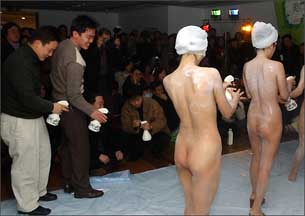

What next? Soon, people would be yawning even if there are only a
hundred naked girls selling whatever.
[WARNING: The provenance of these photos is in doubt. This may not be
Beijing as stated; it could be South Korea or Japan] (See Chosun)
- [012] The Sling Shot Photo
(1/3/2006) This post The Sling Shot
at the Hong Kong WTO has aroused tremendous responses. I am
glad that I am not the only one in the world who still professes
astonishment about this sort of stuff. At InMediaHK,
Oiwan has these four recommended actions:
1. Please do not buy this lying newspaper that pretends to be neutral.
Sing Tao is even more disgusting than Ta Kung Pao and Wen Wei Po, which at
least make clear where they stand.
2. Please tell all your friends and relatives not to buy this newspaper.
3. Please refuse interviews from any member of the press in the Sing Tao
group, and refuse to write for Sing Tao.
4. We ask all the editors and reporters at Sing Tao still with
professionalism to reflect the seriousness of this matter to their bosses.
These actions will not stop until the group publicly apologizes and the
responsible editor is removed. These actions are meant to tell the
mainstream media that the people are not idiots and they know how to say no
to shameful newspapers.
P.S. Shangri La
has a protest letter and addresses for the Journalists Association, Press
Council and Sing Tao.
- [011] Three Chinese Blogs of 2005
(1/4/2006) Flypig's weblog
published this item (in Chinese) from Economic Observer.
EastSouthWestNorth is listed alongside two Chinese stars: Massage Milk and
Mu Mu. Massage Milk is the Chinese winner in the Journalism categoy at
the Deutsche Welle Best of Blogs Competition while Mu Mu was just featured
in the New York Times. So that is quite an honor for me, given that I am an
English-language blogger living outside of mainland China. Here is the translation of the section about
EastSouthWestNorth:
The world is flat? In New York Times columnist Thomas
Friedman's bestselling book for the whole year, the Internet seems to
have broken down all the boundaries between nations and between
people. Various types of information flow unrestricted through the
fiber optic cables at the bottom of oceans.
But in practice, there are objective differences in language.
The information relay between the Chinese- and English-language
blogospheres was in an imbalanced situation from the very first
day. "If an event was not described in English, it did not
really happen," according to Chinese judge Michael Anti at the
Deutsche Welle Best of Blogs Competition. Currently, Chinese
intellecturals go to the English-language media to get the first-hand
news about what is happening on the other side of the ocean. But
most European and American persons can only depend on non-indigenous
foreign correspondents based in China to observe the rapid changes in
this mysterious eastern country.
The appearance of EastSouthWestNorth has more or less altered this
situation. This blog run by a Hong Kong person was able to use
astonishing speed and accurate expression to disseminate in English the
most important viewpoints in the Chinese media and blogs. In the
many news stories in China this fall, EastSouthWestNorth has unwittingly
influenced the viewpoints of the foreign media organizations based in
China, in terms of opinions as well as the manner in which suddenly
breaking incidents ought to be handled.
From the viewpoint of communications theory, the information in mass
media does not flow directly to the audience. Rather, they go
through those opinion leaders who have frequent contact with media
information in order to influence more individuals. Without doubt,
EastSouthWestNorth has begun to play the role of opinion leader in the
process by which information is spread from the east to the west.
- [010] 2005
Statistiscs (1/3/2006) For the year 2005, here are the combined website
statistics:
Total number of hits: 15,198,304
Total number of page views: 3,601,423
Total number of user sessions: 2,943,488
On a daily basis,
Average daily number of hits: 41,638
Average daily page views: 9,866
Average daily user sessions: 8,064
Average time spent per session: 10:12
Not counted is any traffic re-directed to external sites such as Curbside
@ WTO. It goes without say that the numbers were a lot higher
in December than in January due to the rapid growth in traffic. In the
final analysis, I'll have to say that I really don't care. I know how
to boost traffic numbers -- show a lot of scantily clad of women and that is
not my objective. I will merrily go my own way, and I hope that this
is the reason why you come here.
- [009] Young Girl Bathes In Public
(1/2/2006) (6Park)
In the city of Chengdu (China), a hot water system manufacturer had this
promotional idea. Outside it is 3-10 degrees, and hundreds of freezing
citizens are gathered in front of a bath tub filled with hot water.
Soon, when the water reached 42 degrees, a young girl came out and jumped
into the bathtub. After a few minutes, she was directed to stand up and
used the showerhead to direct water on herself. In less than a minute, she turned
and whispered to the director: "It's so COLD!" So she was
allowed to lay back down into the hot water.

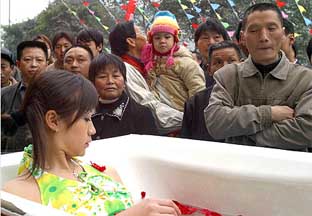
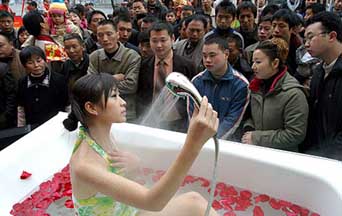
An old female spectator said: "Marketing is getting worse and worse
nowaways. It is so cold out, and that they had to get a young girl to
come and suffer." A company representative said that the girl was
getting a four-figure compensation for the few minutes. The girl came
out later and was interviewed by the reporter. She is a student at an
etiquette professional school. Her family is well-off and she is not
doing this for the money. Instead, she wanted to have more
professional experience.
- [008] Peking University Entrance
Examination (1/2/2006) (Ming
Pao) Here is the essay question that a prospective student is
expected to write 600-700 words. The title is "The Self-Criticism
of a Corrupt Official (貪官檢討)."
The student is supposed to put himself/herself in the place of a corrupt
official and write with the appropriate tone and state of mind.
Furthermore, while the self-criticism should appear to be profound and
earnest, it is supposed to be in fact evasive and flashy without substance
with the goal being to muddle the way through.
Well, the students' preparation obviously did not include this topic.
According to Peking University authorities, they wanted to test the ability of
the student to synthesize and create on matters outside of textbook knowledge.
In terms of pedagogical value, this cuts both ways. On one hand, future
officials are learning how to write self-criticisms. On the other hand,
citizens are learning how to read self-criticisms.
P.S. Here is an untranslatable antithetical couplet from a previous exam:
The students were given this 上聯:「九天攬月華夏英豪馳宇宙」
In reply, one student wrote this matching 下聯:「一意行孤台獨小醜搞公投」
- [007] If Hwang Woo-suk Were Chinese
... (1/2/2006) (Nanfang
Daily) A Fudan University scholar speculates what might happen if
there were a case of academic fraud like Korean "Father of
Cloning" Hwang Woo-suk.
On one hand, it was only forty days when Hwang's American collaborator
announced that he has withdrawn on "ethical" grounds, twenty-three
days since television network MBC aired a program and seven days when Seoul
University began its investigation before the matter was concluded. On
the other hand, it is speculated that the case would have drawn on forever
in China (long enough that no one would remember it).
On one hand, no senior Korean political figure said anything in defense of
the "national hero" and "leading scientist", made
obstructions or interferences or looked for scapegoats on Hwang's
behalf. On the other hand, it is speculated that the case would have
been banned from public discussion, or obstructed and interfered with by
people in politics, academics, departments and local governments due to
personal or group interests, or else an unfortunate assistant or graduate
student will emerge to accept the blame.
On one hand, the results of the investigation in Korea were open, clear and
timely, and Hwang has been stripped of his academic duties and research
funds. On the other hand, it is speculated that such an investigation
would be dragged out over a long time with an ambiguously worded report that
would be kept secret, while the principal continues to function as before.
Of course, all this is speculation. We will know what to look for
when it does happen.
- [006] The Greek Colonels, Brazil and
Beijing News (1/2/2006) You look at the subject title
and you are taken aback. What have the Greek Colonels got to do with
either Brazil or Beijing News? To begin the debriefing, you can start
with this previous post: Brazil In The Time of Dictatorship.
There was this quote:
During the height of the Brazilian military dictatorship of Gen. João Baptista Figueiredo (1979-1985), one political satire and humor magazine,
Pasquim, developed an ingenious ploy for publishing criticisms of the military that got by the censors. Whever the magazine meant to criticize the Brazilian dictatorship, it simply substituted the word "Greek" for "Brazilian." At the time, Greece also had a military government.
Pasquim published numerous articles of gross human rights abuses by the Greek military government. It took government authorities a year to figure out that the magzine was publishing criticism of the Brazilian government to a select segment of the audience that understood the ploy.
It would now appear that there is a brand new
occupation, in which each and every thing that appears in Beijing News
is subjected to this type of interpretation: (see comments January
#
005 and January # 003,
and the famous bird flock photo at the bottom of From
Inside Beijing News - Part 1).
The fun and joy of this exercise is that the thing in itself is not
damnable -- if you whine about it, then everyone will think that you are
paranoid and grossly over-reacting, and that is part of the
entertainment. This is subversion at its best.
- [005] New Game in Beijing
(1/1/2006) The new game in town is called: How to over-interpret what
is inside the Beijing News newspaper. From Beijing
News' photo section today:

Time: Yesterday 16:00
Place: Yangqiao
Scene: The dreams of flying birds belongs to the forests and the blue sky
Photographer: Intern Wang Jiazhu (
王嘉宁)
[004] The Shenzhen Internet Police
(1/1/2006) (Southern
Metropolis Daily) Effective today, anyone who visits
Shenzhen-based websites and forums will be looking at these two Internet
police officers. The name of 'police' in Chinese is
警察
(jingcha). So the one on the left is
named
警警
(jingjing) and the one on the right is named
察察
(chacha). Their presence is to remind
users that the Internet is a place ruled by law where there are Internet
police officers to maintain the social order.


- [003] Basketball Scores in Beijing
News
(1/1/2006) Round 18 of CBA: Beijing 89, Xinjiang 102. News
headline: The Home Base Has Fallen.
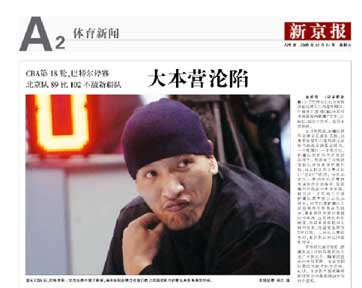
- [002] The Beijing News Story
(1/1/2006) This particular story highlights the difference between the
EastSouthWestNorth blog and mainstream/alternative media. First, there
is no mainstream media coverage inside China. You would not have a
clue that anything had happened. Next, there is sporadic coverage at
the Chinese blogs and forums. It was a game of whack-a-mole, as things
gets deleted at the most popular blogs and forums almost as quickly as they
get posted. Next, there are the western mainstream media stories (see The
Beijing News Strike), which are usually terse, factual and
cold. You have no sense how people in the eye of the storm feel.
By contrast, you can read here From
Inside Beijing News - Part 1, which is a translation of a blog post by
an individual Beijing News worker who urged her fellow workers to fight on: "It
cannot be the case that when the bad guys show up, the good guys retreat.
We cannot give up ... We can still fight one headline at a time, one topic at a
time and one article at a time." You can also read here From
Inside Beijing News - Part 2, which is a translation of a blog post
written by another Beijing News worker about what happened at the office on the day when the news
came out about the dismissals, and then about the department dinner that evening.
"The little Wen girl cried. She said
that she came here because XJB is XJB. If it isn't anymore, she wouldn't
know what to do. I cried too ...."
The lessons are these: the game of whack-of-mole can kill some of the blogs
and forum posts, but there are far too many blogs are there to patrol.
This is a matter of numbers now, and my bet is on those ten thousand points
of light out there. For the English-only readers, a bridge blog such
as this one can bring all the action to you.
- [001] The Case of Wang Binyu
(1/1/2006) In the New
York Times, Jim Yardley discusses the case of Wang Binyu in the
context of China's overall death penalty system. This case has been
cited as one instance in which Beijing News upset senior officials in the
central government -- that is, the reporting dared to challenge and
undermine the court decision. It was also a factor that caused the
Yannan forum to be shut down. Now this is an old case and Yardley's
article does not recount reports on the details of the case. If you
are interested in the case, I suggest that you re-read this old post: The
Case of Wang Binyu (
王斌余),
which is still very incomplete. Specifically, the controversial aspect
is just who exactly did Wang kill and why nobody seemed to be interested in
justice for some of the dead. If this case is supposed to be the
embodiment of larger social problems, then it has not been really
effective. To put it bluntly, the argument is that if you are in a
socially vulnerable group, you should receive extra leniency for
manslaughter because you were forced into it; but if you are in a social
vulnerable group and you are killed by another member of the group in
premeditated fashion, then that's just too bad and you are supposed to blame
the system. This is a more complicated case than it appears, but the
manner by which the death sentence was carried out is simply brutal and
deceptive.
Archives







 (Exit)
(Exit) (Baggage
storage room)
(Baggage
storage room) (Parking
garage)
(Parking
garage) (Staff only)
(Staff only) (Spell
check?)
(Spell
check?)














































